Ardo Corporate Sustainability Report 2022







Chapter 1: We are Ardo 4
- Ardo’s history 5
- Ardo in numbers 8
- Ambition and values . . . . . . . . . . . . . . . . . . . . . . . . . . . 12
- Approach 14
- Our link with the Sustainable Development Goals (SDGs) 16
- Acknowledging our moral code 18 - Good governance . . . . . . . . . . . . . . . . . . . . . . . . . . . . . . . 19
Chapter 2: Food Safety, Quality, and Innovation 20
- Safe and high-quality products . . . . . . . . . . . . . . . . . . . . . . . . . 21
- Developing our products through innovation 25
Chapter 3: We strive for long-term relationships with all stakeholders 30
- Customers in Food Service, Retail and Food Industry 31
- Long-term relationships with our farmers, both directly and through external suppliers 35 - Responsible sourcing from our external suppliers 36
- Collaboration with industry associations 40
- Participation in societal and policy debates 40
- Involvement in collaborative projects 41
- Working with local communities 41
- Interview with Tushar Bahl on Ardo’s supplier assurance approach 42
Chapter 4: We respect our employees 44
- Diversity 45
- Employee safety 47
- Promotion of health and well-being 49
- Interview with Nele Debusschere on ‘We are Ardo’ 54
- Empowering employees 58
- Safeguarding integrity 59
Chapter 5: We minimise our environmental impact 60
- The role of the MIMOSA+ programme in the field management phase 63
- Interview with Guillaume Fraipont on MIMOSA+ 72
- In the production phase 74
Chapter 6: GRI reference table 80
In the 1960s, two West Flemish brothers from the small Belgian town of Ardooie, planted the seeds for the business, now known as Ardo
From a small-scale family farm, our company has grown into a world leader in the production and sales of fresh-frozen vegetables, fruit and herbs And while our structure has changed significantly, our values have remained the same
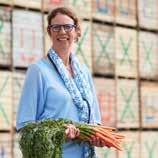
These values have steered our focus toward sustainability, a topic high on the public agenda as climate change intensifies and our environment suffers As the frontrunner in our industry, driven to feed the future, we aspire to provide a sustainable pathway for others to follow It is at the heart of our mission and vision
Three decades ago, the renowned Brundtland report published the guiding principle for sustainable development A definition that is as relevant today as it was back then and which serves as the foundation of our sustainability approach:
“Sustainable development is development that meets the needs of the present without compromising the ability of future generations to meet their own needs.”
We strive to create a double positive impact Nature provides us with food, water, and materials to live a healthy life At Ardo, every decision we make is a conscious choice to preserve those gifts As we care for natural resources, we protect our planet and communities – including the next generations
To leave our mark, we continue to invest heavily in a healthy plant-based offering and a minimal environmental impact
As society’s awareness has grown about the environmental impact of our dietary choices, so have the insights about the health benefits of plant-based nutrition These developments have accelerated the global movement towards a healthy, well-balanced plant-based diet
Our contribution to this shift is our sustainably produced plant-based offering Grown in the open air and frozen locally right after harvest, our products retain maximum flavour and nutritional value
Committed to minimising the environmental impact
In a world overshadowed by climate change, companies like ours are rightfully expected to take action In recent years, we have set up multiple initiatives to reduce our ecological footprint
One of these measures is the optimisation of our water and energy resources ‘Circular economy’ is a key phrase in our production process: the 150,000m³ reservoir in Ardooie that stores discarded filtered process water for crop irrigation, our new BEN (almost energy neutral) headquarters, and biomethanisation installations at several of our plants are a few examples
In addition, we have reduced packaging waste and increased biodiversity on our fields And as part of our MIMOSA+ programme1, we use innovative farming techniques to maximise crop quality while minimising our environmental impact
To achieve our goals, we apply what we have learned from the organic industry As a result, the majority of our conventional crops contain no detectable residues, and our organic production has more than doubled since 2015 .
Sustainability and leadership are intertwined Leadership is vital to achieving our sustainability objectives It is no coincidence that our perspective on sustainability seeps into our approach to leadership “Leadership is to serve others to achieve their meaningful goals,” says Harvard Professor Robin Ely, demonstrating that leadership is about serving others as well as future needs
At Ardo, our team pursues a common purpose As we leverage each other’s strengths, we firmly believe the whole is greater than the sum of its parts
Together, we feed the future.
Gabrielle Kalkwijk, CEO at Ardo
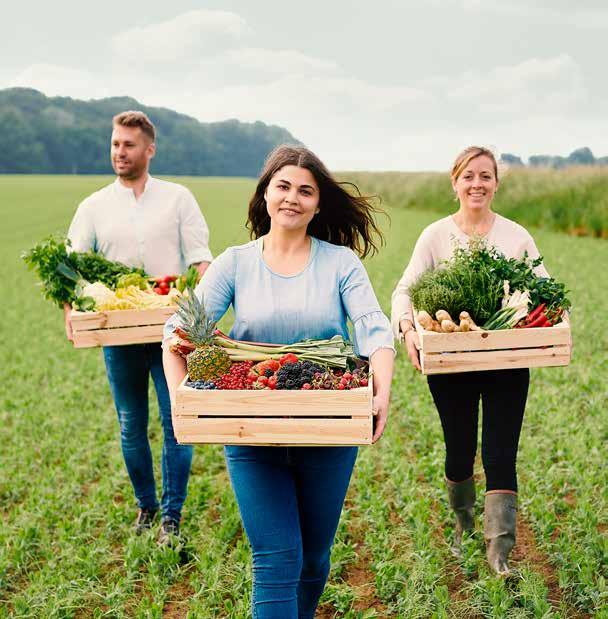
Ardo has been around for over six decades and our spirit is still as vibrant as ever. During these six decades our company has grown into an established global market leader. With this sustainability report, we reflect on our accomplishments thus far and our goals for the coming years.

First, let’s look back at how it all started.
The story of Ardo begins in the 1960s, when two visionary brothers in the Belgian province of West Flanders answer the call of entrepreneurship. While Edouard Haspeslagh grows vegetables on his family farm in Ardooie, which is now the location of the Group’s head office, his brother Richard trades fresh vegetables a few kilometres down the road in Koolskamp. In the 1970s, the Haspeslagh brothers enter the frozen vegetable industry with their own separate businesses, Ardovries and Dujardin

The families join forces and merge both companies in 2014, resulting in Ardo as we know it today.
In 2018, Ardo is named ‘Entrepreneur of the Year’ (‘Onderneming van het Jaar’) in Belgium. A special recognition for our strategic, innovative, internationally expanding, sustainable, and familyoriented entrepreneurship. This achievement would not have been possible without the contributions of our employees, growers, suppliers, and of course our customers.
Edouard Haspeslagh establishes his own company and begins his activities as a fresh vegetable grower and trader on the family farm in Ardooie, Belgium.

Edouard begins producing and selling fresh-frozen vegetables under the name Ardovries.
Acquisitions of factories across Europe ensure the company’s expansion and growth:
1985 - Geer (BE)* 1992 - Saint-Sever (FR) 1994 - Asford (UK) 1995 - Gourin (FR)









1997 - Violaines (FR) 2000 - Alpiarca (PT)* 2000 - Zundert (NL)
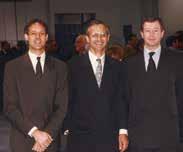
2000 - Nyborg (DK) 2000 - Orehoved (DK) 2005 - Marcilla (ES) 2005 - Badajoz (ES)* 2008 - Gross-Enzerdorf (AT) 2011 - Benimodo (ES)**
* Joint Ventures with 50% participation ** 50% owner, 100% owner in 2015
Between 1977and 2011
The company’s second generation joins the business.
The second generation assumes complete responsibility.
Richard Haspeslagh establishes Dujardin Foods under the initial name Unifrost.
The second generation acquires 100% of the stock and continues down the path of professionalisation.
Acquisitions in France and the United Kingdom ensure the company’s expansion and growth.
Dujardin acquires the following companies: 1999 - Le Moustoir Bretagne (FR) 2000 - Gel’Pam (FR) 2000 - Bonduelle Kortemark (BE) 2006 - Rosemary & Thyme (UK)
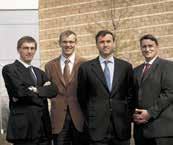
Between 1999 and 2006
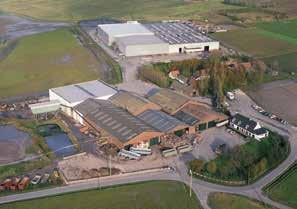
The company name is changed to Ardo.
The third generation start working for the company.
Ardo Production, Packing and Distribution Units
Ardo Sales, Production, Packing and Distribution Units
In 2013, the two family branches begin talking about a possible merger. Both parties are convinced of the benefits of combining strengths and are dedicated to preserving their family values. The discussions result in a series of agreements and formal merger.
In 2017, Ardo purchases a controlling stake in VLM, a Canadian frozen food importer with North American sales, as well as Compañía Frutera de la Paz, Costa Rica’s largest frozen pineapple producer.
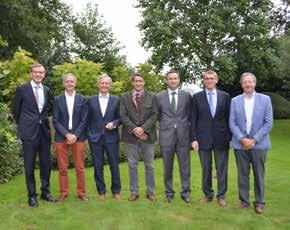
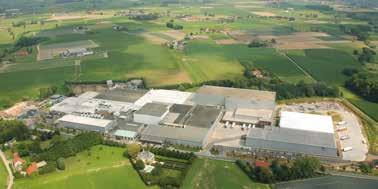
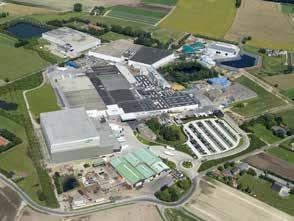
The company name is changed to Dujardin Foods.
The third generation has been working for the company since 2010.
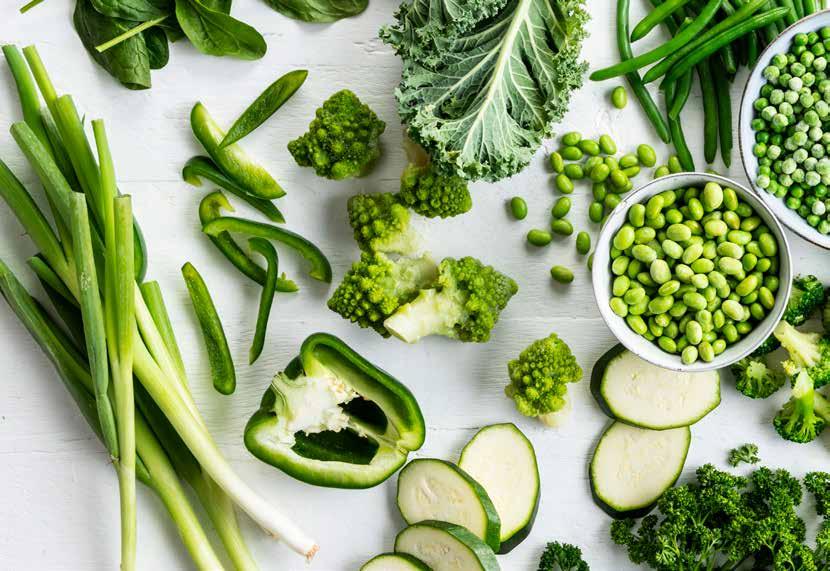

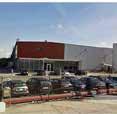
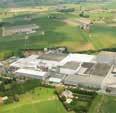
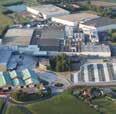
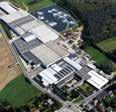
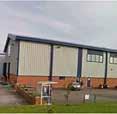

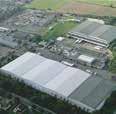
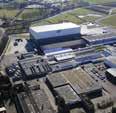
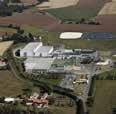
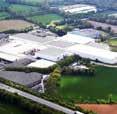
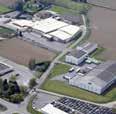
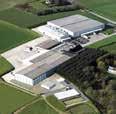
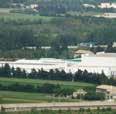
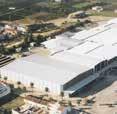

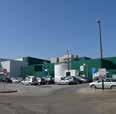

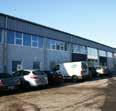
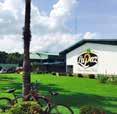
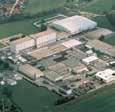
Ardo’s production, packing, and distribution facilities are spread across Europe, from north to south and east to west, with our processing plant in Costa Rica complementing Ardo’s footprint. One of our key
strengths is the close proximity of our factories to our crops. This ensures that the time between harvesting and preserving the maximum flavour and nutritional value of our products in our freezers is kept to a few hours at most.
Because we have local sales offices in Europe, North America, and beyond, we are close to our customers in more than 100 countries. Our ‘glocal’ approach, which takes into account both local and global factors, helps us respond more quickly and anticipate our customers’ needs. It enables us to keep our finger on the pulse in every market
Ardo’s ambition is twofold: we want to feed the future while also protecting nature’s gifts. In other words, we strive for a double positive impact:
By supplying the world with healthy, fresh-frozen vegetables, fruit and herbs, we fully commit to a healthy, plant-based global food transition
We accomplish this by ensuring that our environmental impact is as limited as possible, while keeping future generations’ needs in mind.

We aim to fulfil our ambitions by incorporating four core Ardo values into our daily operations. These values shape our company culture, which has a significant impact on our performance and guides us in constantly improving it
Based on our diverse product portfolio, we strive to provide our customers with solutions that best meet their requirements.

We believe in the products we make and the values that our company represents. We approach our work with energy and enthusiasm, striving to ensure Ardo’s long-term viability.

We work with responsibility and pride, always looking for opportunities and improvements that will benefit Ardo. In our collaborative model, we support our colleagues across the group by working together as one team. We all keep the same goal in mind: to see Ardo succeed.


We are pragmatic, feel comfortable being ourselves, and have a down-to-earth mentality. We are respectful of others, communicate openly, and value every contribution made at each stage of the chain.

We are commited to our customers We are passionate We have a sense of ownership We are authentic
To achieve our goals, we apply a strategy based on five tracks:
We provide fresh frozen vegetables, fruit and herbs that are safe and of high quality. Through our MIMOSA+ programme and SHINE & PURE initiatives, we treat food safety and quality as our top priority, with more on this in chapter 2
To ensure high quality, we highlight the advantage of our factories’ proximity to our fields: we can harvest our crops in a matter of hours while retaining as many vitamins and minerals as possible. There will be more on food safety and quality management in chapter 2
Our production processes, products, and packaging are continuously evolving. In the spirit of our drive for operational excellence, we develop on-trend products that are as appealing, nutritious, and tasty as our standard portfolio. These products help the world move toward a healthy, plant-based diet. There will be more on innovation in chapter 2
Respecting our employees is critical, because they play a crucial role in generating our double positive impact. We show our appreciation by providing opportunities for them to take care of their own health and safety while also feeling good at work.
In addition, we challenge them to grow and develop their skills by offering a diverse training programme. Our approach contributes to their success as well as the success of Ardo. There will be more on our employeeoriented approach in chapter 4
Our efforts to mitigate any negative impact on the environment are visible in every department.
We cultivate reliable and long-term relationships with all of our value chain stakeholders, including our farmers, customers, and suppliers. There will be more on our stakeholder management in chapter 3.
To improve crop resilience to climate change, we implemented the MIMOSA+ programme in our field management strategy. This philosophy aims to maximise yield and quality while minimising the environmental impact. Our focus extends beyond the crop itself to include water management, regenerative agriculture, crop carbon footprint reduction, and biodiversity protection.
In the production phase, we limit energy consumption, CO2eq emissions, water use, and packaging materials. Furthermore, communication with our end consumers about our environmental responsibility turns into a market pull for a plant-based global food transition. There will be more on our environmental impact in chapter 5

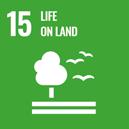
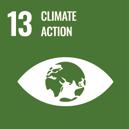
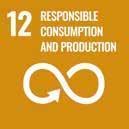

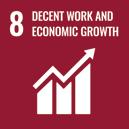
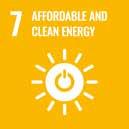
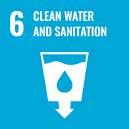
At Ardo, we align our ambitions with the Sustainable Development Goals (SDGs) of the United Nations, a set of 17 global development goals agreed upon by UN member states in 2015. To achieve these goals for a fairer and better world by 2030, we take responsibility for all the ways our fresh frozen vegetables, fruit and herbs are grown and used.
While we aim to contribute to all SDGs, we prioritise those where Ardo can make a substantial difference or provide added value
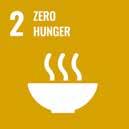
To identify the most relevant SDGs for Ardo, we first examined the suggested SDGs mentioned in Ardo’s previous corporate social responsibility report. We then described the most important aspects of each SDG based on UN documents and searched for relevant activities within Ardo. We considered the SDG to be relevant when the aspects and activities matched.
Our approach is explained in the tables below.
To contribute to the UN goal of achieving a fairer and better world by 2030, we focus on 8 SDGs:
2.1 Ensure access to safe, nutritious and sufficient food all year round, in particular to the poor and people in vulnerable situations
2.4 Ensure sustainable food production, systems and implement agricultural practices, resilient to climate change
6. Ensure availability and sustainable management of water use
Gifts to food banks in Belgium:
• 19-20: 21,452 kg
• 20-21: 134,662 kg
• 21-22: 25,848 kg
MIMOSA+
• Re-use of treated wastewater, rainwater for cleaning and irrigation in Ardooie, Koolskamp, Geer, etc.
• Crops will be subjected to water risk assessments
• Water used to irrigate our crops will come from renewable sources
• Irrigation activities will be based on crop needs or soil moisture deficit measurements
7.2 Increase the share of renewable energy Investment in renewable energy systems
7.3 Reducing the energy used by increasing efficiency
8.4 Improve resource efficiency
Innovation for energy efficiency & recovery
• Waste prevention in the fields: ending the use of non-biodegradable plastic mulching in all crops by 2025
• Waste prevention in the production: reducing thickness of packaging film, replacing non-recyclable packaging, switching from white to brown recycled carton
8.5 Decent work for all & equal pay
8.8 Protect labour rights & promote safe and secure working environments
9. Industrial policy to build resilient infrastructure, promote sustainable industrialisation and foster innovation
12.2 More efficient use of natural resources
12.4 Minimise adverse impacts of chemicals & other wastes on human health and the environment
12.5 Reduce waste generation
12.6 Sustainable reporting cycle
13.2 Integrate climate change measures into strategies and planning
15. Protect, restore and promote sustainable use of terrestrial ecosystems and protect biodiversity and natural habitats
Fair wage - Occupational health & wellbeing
Promote occupational safety
Innovation on several tracks:
• product development
• precision agriculture
• business processes
Optimising the use of natural resources through our circular economy model
Maximising our production of residue-free products
• Buffering sites form neighbourhoods
• Valorisation of by-products
Measuring carbon footprint and setting emission reduction targets
• Biodiversity projects
• Regenerative agricultural practices
Ardo’s business practices are guided by integrity, honesty, fairness, and a strict adherence to all applicable laws. Our Code of Conduct (CoC) describes our working methods and includes policies on bribery, fraud, and corruption.
As an internal guide for the Ardo group, our CoC promotes a business culture based on the highest standards of integrity and transparency. We encourage our employees to seek guidance whenever they are unsure about the best course of action, as it is each employee’s responsibility to ‘do the right thing’. There will be more on this in chapter 4
The CoC is also used externally to support our responsible sourcing policy. Our Supplier Code of Conduct is an essential part of our supplier selection and approval process. There will be more on this in chapter 3
The Ardo family business has evolved significantly during the last six decades. Since the merger between the two family branches of the second generation in 2014, the family has been working consistently to build a professional governance structure, and prepare the transition to the third generation. In 2021, Ardo appointed the company’s first external Chairman of the Board – Mr. Jules Noten - and an external Dutch CEOMrs. Gabrielle Kalkwijk - has led the management team since October 2019. The team consists of experienced professionals, including several members of the third generation.
As a privately owned company, Ardo is exempt from the reporting requirements imposed on public interest entities, or listed companies, trading on a regulated market. However, in accordance with the Belgian Corporate Governance Code, the board of directors set up the Audit Committee. This committee, chaired by one of Ardo’s non-executive board members, keeps an eye on financial risk and internal controls
Supported by the company’s management, the Audit Committee also assesses non-financial risk and ‘double materiality’ impact for Ardo, taking into account the company’s business plan as well as its influence on society and the environment at large.
With an increased emphasis on climate in both business and society, Sustainability Risk Management (SRM) is becoming increasingly important. We use SRM to maintain the proper balance between our company’s
sustainable growth goals and the preservation of nature’s gifts and the environment. Ardo’s SRM ensures that our business strategy, green strategy, and sustainability KPIs are in sync.
Ardo strives to minimise any negative environmental impact by, for example, lowering use of natural resources and carbon emissions as well as carefully controlling the use of plant protection products.
The Audit Committee’s evaluation demonstrates close alignment between our sustainability objectives and profit targets, and it endorses the sustainability goals that we are working towards.
In November 2022, Ardo successfully concluded its first sustainability-linked loan (SLL), with the main objective to harmonize and simplify the company’s debt structure and make the company financing future proof.
This deal fits in Ardo’s Horizon 2025 strategy, which is based on a value-driven approach and focusing on sustainable growth and improving profitability. Based on Ardo’s dual ambition to feed the future whilst protecting nature’s gifts, sustainability is strongly embedded throughout the company’s strategy and day-to-day decision-making. With this deal we are incorporating sustainability in our finance strategy. This approach was very well received by the lenders. The set-up of this SLL is linked to two environmental KPIs, i.e. Carbon footprint reduction (scope 1&2) and Residue-free product, impacting the financing margin grid.
In preparing this sustainability report, Ardo has documented its past and present performance, and shone a light on what the company has already achieved and where the company can still improve, in order to create positive economic, environmental and social benefits.
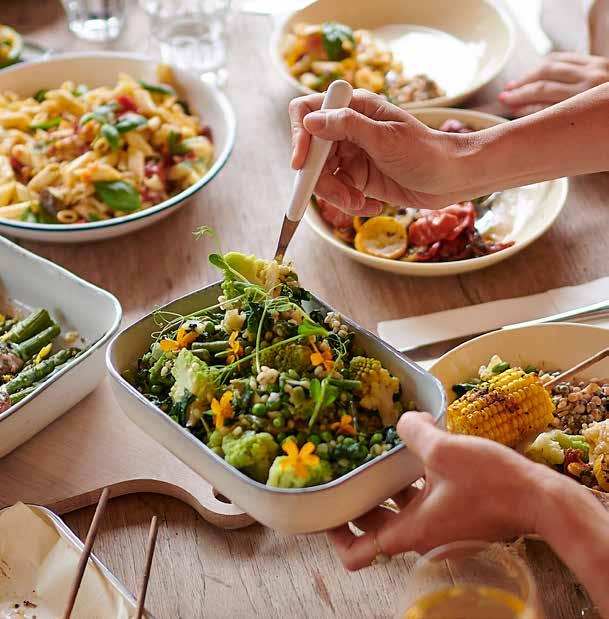
In line with our mission to feed the future, food safety and quality management are our top priorities. In order to improve the quality of our already first-rate fresh-frozen products and provide more convenience to our end consumers, we keep on innovating. Our product innovations, such as European-sourced soy beans, beet bacon, vegetable fries, and many more, contribute to the healthy, plant-based global food transition.
At the same time, we go beyond our product offer by developing innovative solutions for our growing, harvesting, production, and packaging operations. In this section, we share our goals and strategies for food safety, quality management, and innovations.

Our ambition for food safety and quality
Ardo prioritises food safety and quality. These priorities influence how we grow, produce, distribute, and prepare frozen vegetables, fruit and herbs. From field to fork, we implement processes and controls to make sure our products meet regulatory requirements in both the place of production and the country of sale. We are fully committed to ensuring that the fresh-frozen items we produce and sell are safe, legal, and of high quality in order to meet our customers’ needs.

Our daily business is to provide safe food and maintain consistent quality management. Ardo’s group-wide Food Safety and Quality Management System takes a holistic approach to food safety and hygiene as well as quality management through prevention, preparedness, and self-check activities.
In addition to these quality management procedures, all of our production sites are GFSI (BRC/IFS) certified. The Global Food Safety Initiative’s standards are internationally recognised, and include the British Retail Consortium Food Safety Standard and the International Featured Standard, Food. These certifications apply to all vegetables, fruit and herbs that we grow.

Food safety and quality management also apply to products purchased from third-party vendors. As a result, we developed our Supplier Assurance
approach. We supervise these suppliers through our supplier approval procedure, on-site audits, and intake controls on their finished products.
Traceability is also critical in the quality management of our products. All of our products can be traced in two directions using IT systems: from field to fork and from the customer back to the field where the crop was grown. As a result, we always know where our products come from, allowing us to respond to customer inquiries on the subject. Customer and consumer feedback is always taken seriously and seen as an opportunity for continuous improvement.
When it comes to our finished products, our product specifications define all safety and quality parameters, including standards for physical, chemical, and microbiological levels, as well as allergens.
Ardo has a strong food safety and sustainability culture, which is backed up by cross-departmental improvement projects such as SHINE, PURE and MIMOSA+. There will be more on MIMOSA+ in chapter 5
PURE is an acronym that stands for ‘Prevent, Uncover, Reduce, and Eliminate foreign material’. This approach is in line with our commitment to keeping foreign material out of our products.
The PURE project is built on five pillars:
These measures include field selection and weed control. We put in place a field release protocol to ensure that all fields are inspected prior to harvest. This helps to ensure that foreign material from the field is kept out of our products. New technologies, such as drones inspecting fields for foreign material detection, are being introduced as we speak.
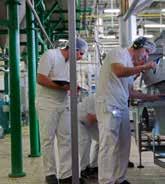
These measures include preventive maintenance, and line integrity inspections and release. Before we begin production, we inspect our lines to ensure that they are clean and free from contamination. The release of each line prior to production is also documented.
This includes the use of cutting-edge technologies to eliminate foreign matter, such as pneumatic separation,
washing, mechanical sorting, optical sorting, magnets, metal detection, and x-ray equipment. For each crop, we define the optimal processing lines with the optimal equipment to eliminate foreign matter.

This includes routine inspection and maintenance of machinery and the surrounding environment. PURE complaints are tracked by site and crop. These findings are used to establish priorities for future improvements and to assess the effectiveness of our actions.
All stakeholders, including farmers, contractors, transportation, production, and management, make a clear commitment to reducing risk at each step of the production chain. A PURE booklet educates farmers about the risk and the steps they must take to avoid foreign material. In addition, PURE crop workshops are held to exchange knowledge and increase awareness.

SHINE is an acronym that stands for ‘Safety and Hygiene In Evolution’. At our Ardo production sites, we set the highest standard for good manufacturing practice and everyday operational hygiene.
The SHINE project is built on five pillars:
We divide our production area into different hygiene zones based on the stages of the process, for example, pre- and post-heat treatment. Within these zones, both staff and traffic flows are restricted.
This includes the creation of hygienic design principles for our manufacturing equipment. This means that all of our equipment and other surfaces such as the ceiling, walls, and floors, are designed to be easily accessible for cleaning.
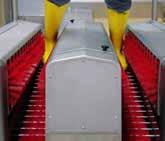

3.
We implement best cleaning practices and procedures.
4.
We monitor the hygiene of products and production facilities by performing microbiological analyses on product and environmental swabbing on productionarea surfaces.
5.
All stakeholders make a clear commitment to hygiene through defined KPIs and targets that are monitored by management. During SHINE workshops, for example, we share best practices with the entire group.
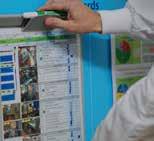
To monitor quality and food safety across all of our production sites, we have established various KPIs and targets. We use these well-defined KPIs to track our
food safety improvement projects on a monthly basis. They are crop-specific, allowing us to assess progress by crop.
Ardo has a unique wide portfolio of fresh-frozen vegetables, fruit and herbs, which includes an assortment in grilled and fried, rehydrated, purees, mixes, burgers and more. Ardo continues to innovate. We listen to our customers’ product requests and assess their needs and market trends. In addition, we develop our product offerings to new tastes, trends, lifestyles, eating habits, and the reduction of food waste. By zooming in even further, we respond to the specific or regional needs of our international market and respond to both local and global trends and requirements.
We focus on three areas to improve the quality of our frozen products:

1. Nutritional food development using the Nutri-Score
2. Promotion of a plant-based lifestyle through dairy alternatives and meat substitutes
3. Increase of the number of recipes that are additive-free and clean-label
Ardo’s innovation strategy is a translation of our mission to feed the future while preserving nature’s gifts. Our primary goals are to provide our customers with new products that optimise the use of our raw materials, with an emphasis on creating value for all parties.

Customers’ requests or internal concepts can be used to generate ideas, which are then fed into a funnel and passed through a stage-gate decision process to determine the viability.
Aside from the funnel approach, an innovation committee controls team deployment on R&D projects that correspond with our strategy. As a result, each project is evaluated based on a variety of criteria using a decision matrix. Some of the factors that influence the beginning of an innovation are discussed in detail below.

Ardo’s product portfolio predominantly consists of pure vegetables and mixes, fruit and herbs. These products are at the heart of our operation. The emphasis is primarily on retaining nutritional value as much as possible through innovative production possibilities. Particularly noteworthy is Ardo’s Field-Fresh strategy, which aims to reduce the time between harvest and freezing.
Products with extra added value represent around 10% of our portfolio, and our grilled and pre-fried range fall into this category, along with our prepared vegetables, fruit blends and herb mixes. Cream-enriched dishes make up the majority of this assortment, whilst products with added ingredients,
such as herbs, spices and butter, provide a greater level of convenience. The goal is to provide end consumers with an assortment of prepared products and kitchen aids, saving them time in food preparation. They can still personalise these products by adding their own flavours or ingredients.
We also offer a line of products that undergoes a grilling or frying step in the production process. When it comes to nutritional value, deep-frying has the most impact, and we carefully monitor the total fat and saturated fat percentages in these products.

Ardo is committed to the preservation of nutritional value, a philosophy which extends to our convenience line. In the absence of an international standard for measuring and informing consumers about the nutritional value of food, we use the Nutri-Score scheme as a reference. Several European countries have adopted this standard to guide their innovations.
Our goal is to achieve Nutri-Score A and B for all Ardo-labelled products. The majority of Ardo brand products are pure products with a Nutri-Score A, and for the smaller number of products in the prepared and convenience category, the vast majority have an A or B rating. We aim to achieve Nutri-Score A or B for the remaining part by modifying recipes or optimising the production process. We will implement these changes gradually.

Our proximity to customers and our glocal approach allows us to provide a market-specific approach, which caters for a wide range of food cultures, taste preferences and national labelling requirements. We see this as an essential part of our service, as consumers in different countries have different taste preferences and consume different foods.


A nutritional label on the front of a package converts the nutritional value of food and beverages into a simple overall score. The score is calculated by taking into account both the nutrients to limit (calories, saturated fat, sugars, and salt) and those to favour (fibre, proteins, nuts, fruit and vegetables).
The score is represented by a five-colour and letter scale (A is green and represents the best nutritional quality, while E is dark orange and represents the worst). Based on the resulting score, which is calculated per 100 g or 100 ml, the food is assigned a colour and letter.
While investigating the frying process, we found ways to reduce the fat percentage without changing the recipe. As a result, we challenged the existing process installation and invested in our root vegetable frying line in France. This has led to a positive outcome: a 6% reduction in fat used in our prepared products in the last 5 years.
Private label recipes are developed on demand in collaboration with our customers, who frequently have their own internal guidelines. Nevertheless, all of Ardo’s input on new developments begins with Nutri-Score A as the starting point. In the frying process, we develop new products with adapted processing parameters that help reduce the product’s oil content.

Consumers are eating fewer animal-derived foods, with an increasing number of people adopting a plantbased lifestyle. They choose this type of diet because of the environment, animal welfare, and their own health. Ardo’s core product line fully supports this lifestyle, and we take pride in making the category as appealing as possible.
As an example, in response to the popularity of cream spinach as a value-added product in our convenience assortment and the growing market for vegan food, we created a plant-based recipe. In other preparations that traditionally call for dairy products, we use plant-based egg and cheese substitutes.
As a supporter of the conscious food movement, we recently added several references that look like meat but are entirely made of vegetables and pulses. Catering for flexitarians, the food industry is attempting to recreate the look and feel of meat with meat substitutes

In addition to developing vegan vegetable recipes and plant-based meat substitutes, we continue to optimise the commercial growing of protein-rich vegetables in Europe, including soy beans, pulses and lentils.

Ardo has long been questioning the use of additives. Simultaneously, the public’s interest in the matter has heightened due to media debates about preservatives, flavourings, or food colourings.
For many years now, we have operated a clean label culture, aided by the increasing availability of natural alternatives. These alternatives have allowed us to drastically reduce our reliance on the permitted synthetic additives, wich are most commonly found in seasonings.
The majority of our recipes are already free of additives. In fact, each new product we develop begins with an additive-free recipe. This is primarily due to our use of different binders, the absence of yeast extract, and our transition from margarine to oil-based recipes.
When it comes to recipes, our goal is to increase the number of clean-label recipes even more. The majority of our recipes are owned by our private label customers. Whenever we see an opportunity to switch an ingredient and avoid the use of additives, we test the theory before presenting it to our customers.
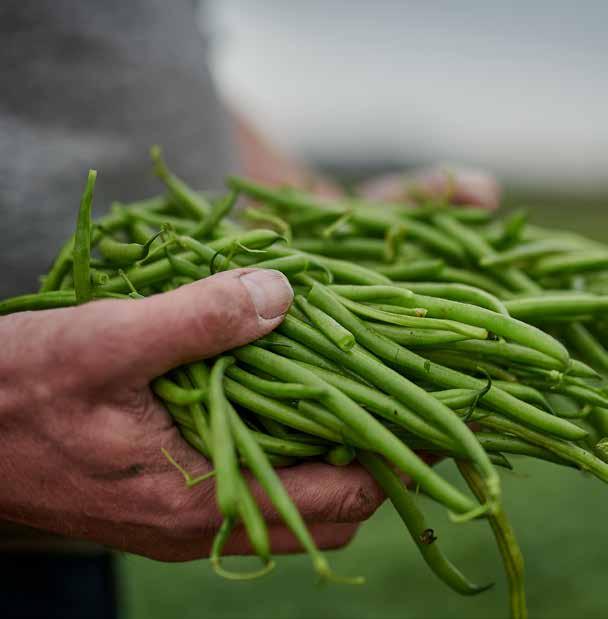
The results of a customer satisfaction study1 conducted by Ardo in 2021 (score: 8/10) confirm our customers’ appreciation and loyalty:
Our goal is for our customers to regard Ardo as the industry leader in service excellence, which is why we are always looking for ways to meet their needs. ‘Think globally, act locally,’ is the motto from our sales strategy.
Our long-term customer relationships are a result of their appreciation for our customer-centric approach. This includes the constant review of our product lines, the delivery of high-quality fresh frozen products, and the continuous improvement of our packaging and logistics processes. Our customers’ confidence is the driving force behind our sales.
“Ardo is a trusted supplier, who manages to satisfy their customers, meeting their expectations The majority see Ardo as an ideal supplier Its strong evaluation also holds up when compared against competitors, where the company performs above average ”
“Ardo meets customers’ key expectations: Product quality, a trustful relationship and a good product range are among these drivers, where Ardo shows a strong performance ”
To deliver safe, high-quality products, we count on reliable, long-term relationships with all stakeholders in our value chain. In this section, we cover how we cultivate connections with customers in Food Service companies, Retail, and the Food Industry, as well as farmers and external packaging and frozen food suppliers. Our stakeholders also include industry associations and representative organisations, other key players in the agri-food industry, policymakers, and local communities. 1
“The satisfaction of Ardo customers is strongly affected by communication, complaint handling, packaging and sustainability Currently, Ardo is doing a great job in communication via primary contacts, and above average in their complaint handling procedure ”
We are working hard to improve internal transparency, clear procedures and integrated systems in order to achieve our industry-leading goal. We coach our commercial team to maintain a constant focus on excellence in areas such as customer communication, internal collaboration, training, and business improvement initiatives.
But still, opportunities for growth or improvement are taken seriously. As an example, we built a customer excellence team with separated focusses on order fulfillment and sales support, and we invested in one integrated IT system.
Satisfaction is driven by a great range of quality products and a customer-friendly culture
“Deep knowledge of the proposed products” Italy
“Ardo has a wide portfolio of products Employees seem dedicated and very well aware of their market and the products they are working” Italy
“Very customer-friendly, supportive and problem-solving thinking!”
Belgium
“Good customer care and product availability year-round with technical proficiency” UK
“Satisfied with the collaboration with Ardo and his key accounts responds quickly to questions regarding samples for product development”
Belgium
“Very good company with an impressive range of products”
Ireland
“I think the strengths are: delivery performance, communications in terms of commercial and logistics part” UK






It is Ardo’s mission to harvest the best from nature and deliver balanced, diverse, and nutritious food to our customers’ kitchens every day. Our extensive selection of delicious vegetables, juicy fruit, and fragrant herbs facilitates the simple preparation of nutritious meals.

To meet the changing needs of our customers, who are diverse in terms of age, culture, and the regions where they live, we provide a wide range of product lines: from Classics, Express, Bio Organic, À Table, Fines Herbes, Les Tapas to Les Fruits.

Our product offering provides multiple advantages for our customers:
For our customers’ convenience, fresh-frozen vegetables, fruit and herbs are pre-washed and pre-cut. The products are easy to portion and do not need to be defrosted before cooking. Our fresh-frozen products save energy and time in the kitchen.
After harvesting, the nutritional value of vegetables, fruit and herbs begins to decline. To avoid this occurring and to ensure that our products retain their maximum nutritional value, we freeze them immediately after harvesting. We do this in our factories near the fields in the country of origin.
We grow vegetables, fruit and herbs in open fields in their natural season. This reduces our environmental impact because they grow in the best conditions possible while using the least amount of water and energy. By freezing our crops as they arrive from the field, we lock-in the nutrients so that our harvest-ripe products are available all year round.
A third of all food produced in the world is lost between the field and the fork. Ardo does everything possible to reduce food waste, including processing all vegetables, even the crooked ones. In addition, our fresh-frozen products have a long shelf life. Customers take what they need and put the rest back in the freezer.

To generate green energy, we collect the leftover waste from vegetable tops and peels, and add it to our biomethanisation plant.
On top of all above mentioned advantages, our fresh frozen products allow our customers to save money while enjoying daily fresh products.
Many of the farmers that grow crops for Ardo today, are following their parents as second or third generation growers for Ardo. Working in close collaboration with our agronomists, our farmers’ skills and experience in cultivation are at the heart of the food safety and quality of our products. In order to support our long-term relationships, we promote the establishment of farmer Producer Organisations (POs) to supply our vegetables, fruit and herbs.
The majority of our growers are members of producer organisations that follow clearly defined rules of the European Union. These organisations provide an ideal platform for coordinated research investments,

the introduction of innovative agricultural techniques, and the maintenance and improvement of yield and quality. Furthermore, they create space for the implementation of environmentally friendly measures that reduce the impact of agricultural activities while increasing biodiversity.
Professionally managed producer organisations offer the structure, support, and information needed to ensure that our agronomists and growers are among the best in Europe. The formation of these groups makes it easier to keep an overview and set priorities that benefit both our growers and Ardo.

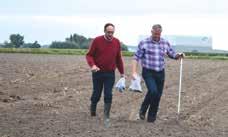
We want to help our growers achieve attractive and financially viable returns while also meeting our customers’ expectations for product quality, food safety, and sustainability. This ambition was translated into our MIMOSA+ programme. The acronym stands for ‘Minimum Impact, Maximum Output Sustainable Agriculture’. Our goal is to reduce the environmental impact of our growing activities while increasing the yield and quality of our vegetables, fruit and herbs.
To carry out this programme, 65 field agronomists actively assist 3,500 farmers to maximise their output while minimising their environmental impact. They also go beyond the crop by promoting, among other principles, both sustainable and regenerative agriculture. There will be more on this in chapter 5
In order to improve our communication with our farmers we are currently transferring from emails, text messages and paper recommendations to a digitalised platform called Agreo, more on this in chapter 5
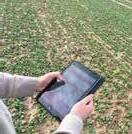
Ardo’s mission is to be the global sustainable leader in plant-based frozen food. We want to accomplish this by introducing innovations, caring for the environment, and promoting a healthier lifestyle. We recognise that the supply chains that support the global food system must be sustainable, balancing today’s needs with those of future generations.
Only by working closely with our suppliers will we be able to achieve our goal. Partnerships based on responsible sourcing help us ensure a sustainable and safe supply of products and materials, whilst providing confidence for our customers and other stakeholders.
All of our external frozen food suppliers are approved and managed centrally by our global Supplier Assurance team. We apply this approach to ensure they all adhere to the same standards.
The fact that our Supplier Assurance Officers, or ‘Local Boots on Ground’ (LOBOs), have a local presence on three continents distinguishes our approach in the market. Our LOBOs closely monitor our suppliers’ performance and support the local development of quality assurance processes.
During the growing and harvesting seasons, they spend time on suppliers’ fields and in factories, assessing their
agricultural and processing practices. The goal of our LOBOs is to promote quality, food safety, legal, environmental, and ethical compliance throughout our entire supply chain.
In addition, our LOBOs help our partner suppliers improve by transferring knowledge from our own production. They assist them in their individual development journeys to provide high-quality products that meet Ardo’s standards and our customer expectations.
Our Supplier Code of Conduct (CoC) is a tool that supports our partnerships for responsible sourcing. This code establishes conditions and expectations for our suppliers, producers, external manufacturers, and other supply chain stakeholders. These conditions and expectations cover labour, ethical and legal compliance, the environment, and (food) safety.
The Supplier CoC is critical instrument that helps ensure that we meet our business objectives while also creating a positive social impact and reducing our ecological footprint.
Our Supplier CoC contains a list of requirements that all of our suppliers must meet in order to do business with Ardo:
1. Obeying the law
2. Conducting business with integrity 3. Maintaining accurate and truthful records
4. Meeting business obligations 5. Treating people with dignity and respect 6. Protecting Ardo’s information, assets, and interests 7. Being a responsible global citizen
Our goal is to build trusting relationships with carefully selected suppliers and partners who adhere to these seven guiding principles. The Supplier CoC replaces our Ethical Policy to emphasise our commitment to working with our suppliers. This is to ensure that all parties have a long-term, sustainable, and successful future.
Our Supplier CoC will be implemented in 2023 for suppliers of the following product categories:
- Purchased frozen foods, vegetables, fruit and herbs
- Sustainable oils and fats
- Ingredients
1. Purchased frozen foods, vegetables, fruit and herbs
In addition to supplier approval programmes, we adhere to legal guidelines and European Union and US standards in the selection and validation of externally purchased materials and products. These guidelines concern food safety and quality, and the use of pesticides and agrochemicals.
In addition, our external suppliers must follow our internal food safety and quality policies, certification criteria, and auditing standards. For the frozen category, we adhere to our supplier assurance goals and strategies in terms of quality standards, ethical compliance, and agricultural practices.
Ardo makes every effort to avoid using palm oil. However, this ingredient may be present in some of our purchased raw materials or fried finished products. Since 2016, we have switched to using sustainable (RSPO) palm oil only, and restricted its use to only 10% of the oil contained in our products. RSPO palm oil, as certified by the Roundtable on Sustainable Palm Oil. Visit https://rspo.org for more information.
Sunflower, rapeseed and olive oil make up the remaining 90% of oils used in our portfolio of fried products.
Ardo purchases specific ingredients such as rice, grains, and dairy-based raw materials. Despite our relatively small volumes in these large global markets, we validate and select our vendors by sharing our Supplier Code of Conduct. We investigate their sustainability strategies and evaluate their quality performance and future sustainability goals.
New suppliers are only approved after a thorough internal and external vendor validation process.
This is done in close collaboration with our global Supplier Assurance team who are required to approve new suppliers.
Once our vendors have been approved, we help them carry out programmes that lower their carbon footprint, and minimise their social and environmental impact.
Audits, assessments, controls and verification of certificates, are used to monitor the performance of our external suppliers. We apply various monitoring tools based on major topics and criteria, such as:
Social compliance (SMETA/Sedex, amfori-BSCI audits, and ILO)
• Food safety compliance (GFSI, Ardo on-site technical audits, and GLOBALG.A.P. certification)

• Farm sustainability topics (GLOBALG.A.P. certification), and the Farm Sustainability Assessement from the Sustainable Agriculture Initiative Platform (SAI Platform).
We set KPIs to track responsible sourcing in a meaningful way, with one currently in place for socially responsible external suppliers. We are developing another KPI on sustainably grown externally purchased vegetables, fruit and herbs.
Definition: The share of frozen food suppliers which are Sedex1 members, as well as the share of suppliers in high-risk countries who are SMETA2 audited.
We use Sedex1 and SMETA2 to monitor our suppliers’ social and ethical compliance.
Progress: Compliance status as of July 2022
High risk Low risk
Objective and time frame: By 2023, we will have 100% of our frozen food suppliers registered on the Sedex platform, and 100% of our suppliers in high-risk countries will be SMETA audited.
For KPIs on external suppliers certified for good agricultural practices or sustainable agriculture, we use GLOBALG.A.P. certification and/or SAI Platform-FSA certification
Definition: The proportion of GLOBALG.A.P. certified products and/or FSA certified products in our purchased items portfolio.
Past evolution (partial in fruit): we increased our fruit share from 50% (2015) to 64% (2021).
Status for fiscal year 2021-2022: FSA/GLOBALG.A.P. is currently only measured for fruit; we are looking into expanding these certifications to include purchased frozen vegetables, herbs, and ingredients.
For fruit, our 2030 goal is to achieve 75% certified products across our purchased items portfolio.

We set a KPI for socially responsible external
National Industry Associations
Ardo is a member of the national federations of processed fruit and vegetables in Belgium, France, Spain, Germany, the Netherlands, the United Kingdom, and the United States. We participate actively in discussions about sustainability and food safety across all of these associations.
PROFEL - The European Association of Fruit & Vegetable Processors
Ardo serves on the board of directors in addition to being a member of PROFEL’s sustainability working group. Ardo also chairs the association’s Technical & Legislative Committee.
The European Commission’s Advisory Group on Sustainability of Food Systems
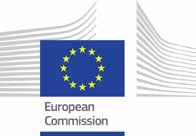
Ardo serves as PROFEL’s designated expert on this esteemed advisory board.
International Food Waste Coalition (IFWC)
Ardo was a founding member of the IFWC and a major contributor to the coalition’s early direction and its first major projects.
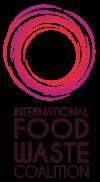
Regenerative Agriculture Ardo joined the Sustainable Agriculture Initiative Platform (SAI Platform) to collaborate with other key players in the agri-food industry. One of Ardo’s ambitions in this forum is to develop sector-wide workable solutions for carbon capture and building soil health in commercial agriculture.
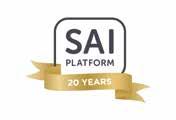
Food safety Ardo was a key contributor to the development of European hygiene guidelines for the control of pathogens during the production of frozen vegetables. The guidelines have been endorsed as a community guide by Member States and the European Commission.
To support our local communities, we have made several donations to Belgian food banks over the years:
In light of the war, we made a 36,589 kg donation to Ukraine. This amounts to two full trucks of frozen vegetables, fruit and meals. Some Ardo sites also organised local fund-raising initiatives. The Ardo Ashford and Eye (United Kingdom) locations, for example, raised £4,740 for the Disasters Emergency Committee (DEC) in Ukraine. DEC charities and their local partners in Ukraine and neighbouring countries are working to meet the immediate needs of war refugees.
Tushar Bahl relocated from India to Europe to pursue a Master’s degree in sustainable food technology and management. He started at Ardo for a six-month internship and felt at home right away. Six years later, he continues to appreciate our family values and our company culture of prioritising people in business decisions. Driven to contribute to the preservation of our planet and the needs of future generations, he is convinced the time to act is now: “I am proud to be a part of Ardo’s sustainability initiatives.”

“85% of the products we sell are grown for Ardo under the supervision of our agronomists, and then frozen in-house at Ardo factories. The remainder are sourced externally, which means they are purchased,” Tushar says. “Ardo strives for purchased products to meet the same high standards of food safety, quality, sustainability, and ethical compliance as those sourced locally,” he continues.
That ambition led to the creation of the Supplier Assurance department, which he oversees, and the development of closer links with suppliers.
As Group Quality Manager, Tushar Bahl is responsible for the Supplier Assurance team, which he built from the ground up.
“By creating confidence in these goods, we aim to grow our purchased products category into a key selling player,” Tushar explains. These purchases fall into two categories. “The first is related to contingency purchases,” he says, “which allow us to meet demand even if we are unable to deliver our projected volumes, for example, due to weather issues. The second includes tropical fruit or exotic ingredients that aren’t grown in Europe, such as ginger, garlic, or chilli. These products are related to our goal of expanding our product portfolio and providing a one-stop shop for our customers.”
recognised sustainability standards such as the GLOBALG.A.P. or FSA certifications. In addition, our officers audit their sustainability compliance to ensure that it is in line with Ardo’s objectives.”
Raising the bar through supplier classification
Based on this classification system, current suppliers have been divided into three tiers. “As we phase out tier three suppliers to reduce food safety and quality risks, we cultivate strong relationships with our tier one suppliers.” Tushar continues, “They serve as strategic partners. We optimise our supply base by working with dependable suppliers who can meet our needs, not only in terms of food safety and quality, but also in terms of sustainability and ethical compliance.”
Supplier Assurance Officers aid in the growth of these strategic partners by sharing knowledge and expertise on how to produce the best crop. “With this approach, we can bring them up to our standards,” Tushar says. “Our suppliers value this knowledge transfer because they do not always have the knowledge or resources to invest themselves. This creates a win-win situation for Ardo because by assisting our suppliers, we ensure that we become an important customer.”
The Supplier Assurance team leaves a mark
The Supplier Assurance department is made up of Supplier Assurance Officers, who are highly qualified individuals with expertise in food safety and quality management. “Our approach stands out because our officers are located near our suppliers in Europe, South America, and Asia. They collaborate closely with them and monitor their performance. That’s why we call them our ‘Local Boots on Ground’ (LOBOs).” Tushar describes them as “our local eyes and ears, as well as the link between our suppliers and buyers.”
Along with a centralised purchasing of externally sourced goods at the group level, the team developed a standard policy for approving and managing group suppliers. They use a classification system based on a number of criteria. “On our digital platform, we keep track of our approved suppliers, including their food safety and quality management procedures. We also investigate whether our suppliers meet internationally
Encouraged to continue improving Tushar is most proud of the team’s accomplishments thus far, particularly the elimination of intermediaries such as brokers or traders. “Working through third parties reduces traceability back to the grower or field level,” he explains. “Instead, we work directly with suppliers to ensure transparency and control of the growing base and supply chain.”
Tushar and his team’s efforts have been recognised throughout the organisation for making a significant difference. “Knowing that our contribution is valued motivates us to constantly improve the value of our purchased products.”
“Our centralised approach helps us grow our purchased products category into a key selling player”
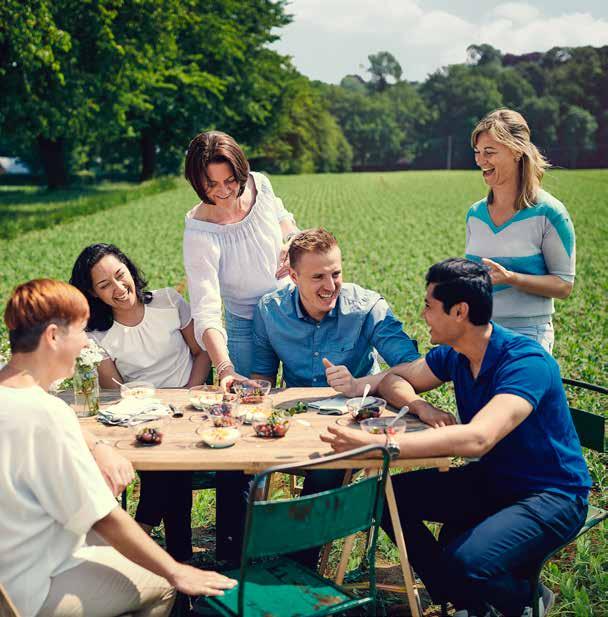
To ensure our employees’ health and happiness, we support them on multiple levels and provide them with opportunities to grow and develop. This is critical to both their and Ardo’s success. We go the extra mile to show our appreciation in a variety of ways, several of which are covered in this section.
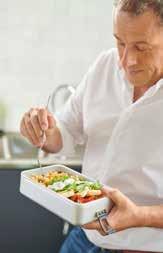

Ardo serves millions of people worldwide every day, and we are proud to reflect the diverse world we live in. In terms of hiring, we consider applicants of any age, gender, cultural background, or religion.

When it comes to diversity, our (local) management teams have 228 members, with 68% men and 32% women. Ardo is an international group with headquarters in Belgium, and Mrs. Gabrielle Kalkwijk, our CEO, has Dutch nationality.
We recognise the need to accelerate our efforts to increase diversity in our leadership and management teams. As a result, we introduced the Tiara1 Leadership Programme. It brings together female managers from different Ardo sites and countries to help them improve their personal leadership skills and strengthen their internal network.

We now have 45 women enrolled in the programme, divided into several groups, with an additional 24 women ready to join the programme. The plan is to expand even further each year.
Our top priority is the safety of our people. To fulfil this commitment, we work on various levels on a daily basis to reduce the risk of accidents
The number of accidents resulting in more than 8 hours of absence for employees, temporary and external workers per million working hours.
Between 2018 and 2021, the frequency decreased from 32.9 to 22.6.
To monitor our employees’ occupational safety, we use the international standard of the injury frequency rate as a KPI on workplace accidents.
Respecting
our employees
Occupational Health & Safety is a subject of grave concern for the agri-food sector, and we take our responsibility in the chain seriously by encouraging safe behaviour, to protect our employees, sub-contractors and visitors to our sites, to ensure that they remain safe at all times This goes beyond our sites, with initiatives that support our farmers and contractors on the fields

We actively work to improve our group-wide safety culture through a variety of initiatives that protect our employees’ safety
With human behaviour recognised as a crucial factor in ensuring a safe workplace, in 2019 we launched an ambitious safety behaviour programme in collaboration with an external workplace safety consultant Another example involves our plants and machinery, where we are constantly inspecting, maintaining, and improving the technical safety of our new and existing equipment
We established a core safety team from different departments to assist local safety officers as well as emphasise the importance of safety throughout the Ardo group The goal of this set-up is to collect and share best practices and improve factory communication
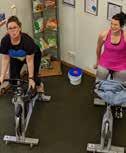
At Ardo, we value our team for giving their all every day, with enthusiasm and passion. Throughout the year, several colleagues volunteer to organise activities that promote togetherness and team spirit while also providing a fun atmosphere. Under the slogan ‘We Are Ardo’, the activities are divided into five categories, each with a different focus: fit, fun, green, proud, and talent.

We have implemented a health promotion policy to keep our colleagues physically and mentally fit. The Fit@Ardo team encourages employees to be physically active at work, at home, and, if possible, while commuting. The working group also promotes healthy eating habits.
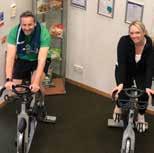
Example 1 - Fit@Ardo organises low-threshold activities such as Nordic walking tours (Koolskamp, Belgium) and warming-ups (Violaines, France) before or after shifts, or during lunch breaks.
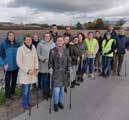
Example 2 - 163 employees participated in an indoor cycling event, biking 1,554 miles in 5 days at the Ardo sites in Ashford and Eye (United Kingdom). This was not only a physical challenge, but also a fundraiser for Ukraine. We made a donation of £4,740 to the Disasters Emergency Committee (DEC). DEC charities and their local partners are working in Ukraine and neighbouring countries to provide food, water, medical assistance, protection, and trauma care to refugees.
Example 3 - Fit@Ardo in Benimodo (Spain) created ‘Ardo A Punto’, a health programme aimed at improving employees’ physical fitness.
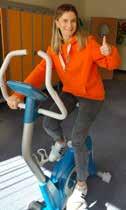

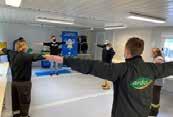


In addition to business as usual, there is also time for pleasure. Throughout the year, the team of Friends@Ardo organises fun activities that promote togetherness and team spirit. The idea behind these initiatives is that an employee who enjoys working in a fun work environment will carry that feeling into their personal life.
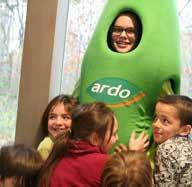
Example 1 - Every year, Friends@Ardo hosts a Saint Nicholas party for all Koolskamp and Kortemark (Belgium) employees and their families. A memorable day full of fun and presents.

Example 2 - After the COVID-19 lockdown restrictions were lifted, we held a celebration event at our sites in the United Kingdom. After two years apart, we were able to reconnect while celebrating our values and those who embody them.

Example 4 In the summer of 2022, our employees in Denmark gathered with their families to watch the Tour de France begin. They watched the race together from the front row while enjoying a barbecue made with Ardo products.



Example 5 - In the summer of 2022, our JV site, Monliz (Spain), organised a unique competition among all teams for the best dish made with Ardo products.

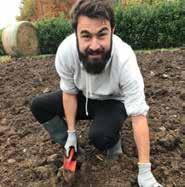
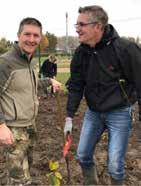

Our green heart continues to beat even when we close the Ardo door behind us at the end of the day. The Green@Ardo team strives to instil the spirit of green sustainability in all employees, inspiring and encouraging them to work together for a sustainable future. According to the Green@Ardo motto, everyone can contribute to small and large-scale actions. Each one counts.


Example 1 - Employees of Ardo Koolskamp, Belgium, can pick up our products at a very low cost from a product vending machine. This allows our staff to enjoy the healthy Ardo products at home, thereby promoting a healthy diet.
Under the banner Proud@Ardo, we want all Ardo talents to shine even brighter by highlighting them with playful actions. We also aim to make our Ardo products known to our employees.
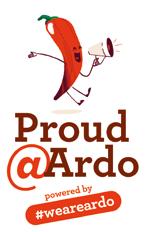
Example 2 - We participate in Christmas festivities by promoting Ugly Christmas Sweater Day. It goes without saying that our team has as much fun creating the pictures as they do sharing them.








Example 3 - Our JV site, Monliz (Portugal), regularly hosts a cooking workshop, where employees use our Ardo products to prepare a delicious group meal.
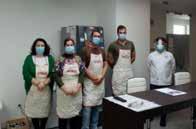

With a background as a dietician, a passion for nutrition, and a home in Ardooie, West Flanders, Nele Debusschere was destined to join Ardo. In the 13 years she has been with us, our approach to innovation has evolved significantly, which has kept her position in R&D challenging. With climate change accelerating, Nele recognises the importance of sustainability in her field: “Seeing Ardo as a frontrunner of sustainable initiatives at all levels to support nature strengthens my appreciation for my job.”

Nele Debusschere combines her roles as Group R&D Manager and project leader for ‘We Are Ardo’, a programme that promotes employee well-being activities.
‘We Are Ardo’ provides low-barrier ways for employees to get to know one another and create synergies across departments. “The idea is that by nurturing a feel-good factor, our colleagues will be happier at work, and ultimately our company will be more successful.”. That is what we aim to accomplish through fun, social, and informal activities,” Nele explains.
It’s no surprise that she loved every minute of it: “I see work as a broader concept, a chance to meet new people. Extracurricular activities give me extra energy in my daily job.” In addition to being one of her favourite memories to date, the success of the sports initiative motivated Nele to do more.
“I thought a structured approach would benefit the company. One that would integrate previously coexisting activities while meeting all employee needs.” With those ideas in mind, she developed the ‘We Are Ardo’ concept.
The initiative is divided into five working groups. Each one is supported by volunteers who meet once a month to brainstorm and plan their upcoming activities. They share “a healthy dose of enthusiasm and organisational skills,” according to Nele. “Our more than 50 volunteers are creative and have a strong desire to bring people together and see them thrive.”
Every group has a distinct focus. ‘Friends@Ardo’ hosts social gatherings, ‘Fit@Ardo’ organises sports activities, and ‘Green@Ardo’ plans environmental initiatives. While ‘Talent@Ardo’ supports our external employer branding, ‘Proud@Ardo’ demonstrates how proud people are to work at Ardo.

The fact that ‘We Are Ardo’ was founded by and for employees is what sets the concept apart. Nele explains what prompted it: “Three years ago, we received a sponsorship request in exchange for sports activities at work. I coordinated the initiative and communicated about it with a few colleagues,” she says. “Around 300 employees participated in energy breaks and other sports activities with a personal trainer, making it a huge success.”
“Our down-to-earth mentality has persisted no matter how large we have grown,” Nele says. “Which means our management team remains approachable. They jumped on board right away and have shown their appreciation in various ways, including providing us with time and funding for our activities. Their response to the ‘We Are Ardo’ concept demonstrates that our company provides opportunities and values its employees.”
Employee reactions are also extremely positive, as evidenced by the success of activities. Since its launch, the ‘We Are Ardo’ team has organised events such as after-work drinks, a Bike to Work Day that includes breakfast for employees who cycle to work, and a ‘plogging’ activity that involves collecting litter while walking. They have also hosted initiatives for the families of employees, such as a family bike or walk day with an Ardo lunch provided, and a kids’ photo hunt during the summer holidays. While some activities are held for the entire group, such as the “Ugly Christmas Sweater Day”, others are organised on a more local level, based on the (cultural) needs and specificities of the location.
While Nele is gradually preparing to hand over the torch as project leader of ‘We Are Ardo’, she has high hopes for the future. “My dream is for the concept to become widely recognised among all employees. And for our team to create a series of regular events based on a set of guidelines. I hope ‘We Are Ardo’ becomes a well-oiled machine that consistently strengthens our sense of community.”
“Extracurricular activities give me extra energy in my daily job.”
As a result of Covid, we began working in a new manner over the last two years. During the pandemic, working from home was required whenever possible, a reality to which we quickly adapted. We provided our employees with the necessary resources and reorganised our communication channels. Even after COVID-19, we want to give our employees the option of working from home.
To enable this, we developed a new home working policy, which is now in use at several sites. The policy is being implemented in stages.
60% of our white-collar employees who can work from home do so on a regular basis. This equals around 250 people for the Ardooie headquarters and plant, as well as the Koolskamp/Kortemark plant (Belgium).
Exceptional people require an exceptional working environment. Our new headquarters in Ardooie (Belgium), also referred to as the “Rootbox”, which opened in September 2021, is a perfect fit.
Our new headquarters was built using ‘almost energy neutral’ building principles
Our brand-new head office consumes very little energy and only uses energy derived from renewable sources.
The natural light makes the building a pleasant place to work because of the light-filled structure we chose. Glass, however, insulates less well. To compensate for the lower insulation, we used triple solar control glass and implemented sustainable technologies:
- A perforated aluminium façade, which protects against summer overheating - Heat recovery ventilation

- Heating and cooling with residual heat and cold from our distribution centre - Solar panels and LED lighting
The construction of our office building also provided an excellent opportunity to introduce a new way of working based on bricks, bytes, and behaviour:
Our new office building promotes activity-based working by encouraging our employees to move around throughout the day and use the spaces that best suit their needs.
Our new way of working allows employees more flexibility to work when and where they are most productive. We promote home working and have strengthened our digital communication techniques as a result.
To promote paperless work, we encourage employees to think more carefully before printing.
In order to learn more about our employees’ experiences, we conducted an extensive survey in collaboration with the University of Leuven. The survey inquired about their satisfaction with our new headquarters building as well as potential areas for improvement.
The three most important conclusions were:
- There is a good fit between what the workspace provides and what employees need in order to do their jobs
- Employees place a high value on physical workplace aspects such as air quality, light, reflection-glare, and the number of workstations
- The new workplace promotes and facilitates interaction among co-workers. There is also a link between an innovative mindset and activity-based work
agree
Worksplaces
Facilitate & encourage interaction with colleagues
As a dynamic family business, we firmly believe that our employees are the driving force behind our company. It is thanks to their knowledge, skills, and dedication that we are able to produce and market high-quality products all over the world. As a result, we want to give our employees every opportunity to learn and grow
Our Ardo Leadership Programme represents our commitment to assisting our employees in their leadership development. The goal is to develop their personal and team leadership skills.
The programme is divided into several modules, some of which focus on personal leadership (open to all) and others on team leadership (open to people managers). More than 200 employees are taking part in the entire programme, with another 325 following specific sections. The programme will be expanded in the future.
We want to inspire our employees’ enthusiasm and knowledge for our vegetables, fruit and herbs.
As a result, we introduced our Crop Academies, which are an excellent way to learn about our company’s operations. Each Crop Academy session focuses on a different product and is recorded for later viewing. Our internal platform houses all previous Academies’ presentations.
In terms of Crop Academies, about 15 webinars are held each year, with attendance ranging from 30 to 80 employees. If we take an average of 40, this equates to 600 attendees per year across all Ardo sites.
In addition to comprehensive orientation programmes for new employees, job-specific training courses, and digital tools, we have broadened our scope to include leadership, business knowledge, and business information distribution.
We firmly believe that an informed employee is an engaged employee. Through our quarterly town hall information meetings, we want to include as many of them as possible in the inner workings of our company, strategy, and numbers. This initiative adds to the understanding of our business.
Our town hall meetings provide information to our white-collar employees, who translate and distribute insights to their teams. The regional meetings are attended by approximately 1,200 employees from all sites, with 60% recorded participation.
The most effective tools for guiding performance and quickly correcting errors are regular check-ins and feedback moments. For this purpose, we have an annual performance appraisal process in place. Our goal is for every employee, regardless of their position, to understand how they performed in the previous year and what is expected of them in the coming year.
The performance appraisal also identifies employees who want to advance in their careers. For those who demonstrate a strong potential and motivation, we strive to accommodate realistic career moves with a focus on long-term development.
Since the very beginning, our business practices have been guided by integrity, honesty, fair dealing, and strict adherence to all applicable laws. As a result, every Ardo employee must fully understand and adhere to our policy of ethical compliance in their daily work.
We foster a transparent business culture by encouraging employees to report potential fraud, bribery, corruption, or other unethical behaviour or conduct at an early stage. This implies that they should not be concerned about retaliation. Whistleblowers are assured that they will be treated fairly and that their allegations will be thoroughly and objectively investigated.
To ensure that everyone is aware, we inform our employees on a regular basis about our anti-bribery, fraud, and corruption policy. This information is distributed in various ways, including as part of our employment package, on company posters, and on the intranet. In addition, an excerpt from the whistleblowing procedure is available on our website to inform third parties and provide direct access to our grievance mechanisms.

As part of our goal to minimise Ardo’s negative environmental impact, we strive for operational excellence throughout the value chain. All of our farmers are verified at silver or gold level against SAI Platform’s Farm Sustainability Assessment (FSA). Furthermore, since 2013, we have gone a step further in crop management with the successful roll out of our MIMOSA programme. Now, we are even looking further than the crops themselves, with our MIMOSA+ programme.
In the field management phase, we use our MIMOSA+ programme to create optimal growing conditions that maximise yield and quality while minimising our environmental impact. We look beyond the crop itself by promoting optimal water management, a lower crop carbon footprint, regenerative agriculture practices, and biodiversity. During the production phase that follows, we limit energy consumption, CO2 equivalent emissions, water use, and packaging materials.
We consider our environmental impact not only for the sake of the planet, but also for the sake of our customers. We believe that end consumers feel better knowing that the vegetables, fruit and herbs they eat, are grown, cleaned, frozen, and distributed with minimal environmental impact. Communication about our environmental efforts can address a largely unconscious consumer desire to do good by caring for the planet.
Communication with end consumers about Ardo’s environmental responsibility can also serve as a market pull for a global food transition to plant-based products.
In this chapter, we describe how we minimise our environmental impact at the value chain’s operational level.
We focus on the most critical stages of the lifecycle of our vegetables, fruit and herbs:
• In the field management phase, we implement our MIMOSA+ programme for crop optimisation and climate change mitigation.
• In the production phase, we examine our carbon footprint, as well as how we manage our energy and water consumption, organic waste streams, and packaging activities.
• All external transportation impacts are out of the scope of this report and will be determined later. Based on this footprint, we will define our long-term goals for external transportation.
Farmers play an important role in ensuring the quality of our vegetables, fruit and herbs. Aside from the soil fertility across our 12 sourcing regions, the skills and experience of our farmers and agronomists in growing and harvesting our fresh raw materials are critical.
MIMOSA+ is an acronym that stands for ‘Minimum Impact, Maximum Output Sustainable Agriculture’. Our MIMOSA+ programme has several goals. First is to reduce the environmental impact of our growing activities on the planet, second is to improve the quality and yields of our vegetables, fruit and herbs, and finally is to build greater resilience to climate change into the way that we grow our crops. MIMOSA+ enables us to offer our growers attractive and financially viable returns, whilst meeting our customers’ expectations in terms of product quality, food safety, and sustainability.

Ardo’s strategy has always relied on an integrated production system and a close relationship with growers. We have been actively supporting the formation of farmer Producer Organisations (POs) for many years, investing in mechanisation, technology, and R&D.
In 2013, we launched our original MIMOSA programme to guide our 65 field agronomists in assisting our 3.500 farmers with field management. Each year, hundreds of trials are conducted, benchmarks are
performed and technical meetings are organised for our field agronomists to challenge and improve our growing techniques. The best practices identified, are formalised in our crop protocols to be implemented by the farmers during the season. Our crop protocols help to distinguish Ardo products, by ensuring a unique approach to crop management, reducing the inputs wherever possible, with the majority of our final products predominantly free of pesticide residues. All good practices and new technologies are of course used to minimise our impact on the environment.
Our MIMOSA+ programme focusses on the following priorities:
- Reduced input
- Ambition for zero residue
- Field-specific innovations
- Digitalisation
- Promotion of safety in the field
- Competitiveness and profitability of crop production

Year after year, we choose new crop varieties that are more vigorous and disease-resistant. In parallel, we use precision sowing techniques to establish an optimal plant population, reduce the quantity of seeds used, and create an open and aerated growing environment for our vegetables and herbs. As a result, we have significantly reduced the use of plant protection products on our crops. Over a 5-year period, average fungicides went down by 28%. We believe that we can continue to reduce by up to 40% by 2025.
Changing our practices to MIMOSA has numerous advantages for our farmers, the environment, and the quality of our products. A strict application of preventive measures such as good rotation, cover crops, and responsible input use, leads to better growing environments for our crops and a lower reliance on crop protection products. As a result of using fewer plant protection products, there are fewer pesticide residues on our fresh-frozen products.
The percentage of our production with residues less than the detection limit (<0.01 ppm) has become one of our primary KPIs for measuring the progress of our MIMOSA practices. Every year, our quality departments conduct over 1,200 random pesticide residue analyses on our frozen products.
The volume of frozen vegetables found to be free of quantifiable levels of pesticide residue (below the detection limit of 0.01 ppm) reached 76% of our group production in 2021, up from 56% in 2014.
This positive evolution is the result of our team’s Active Field Management and collaboration with our 3,500 farmers. We will continue to work hard and we are confident that by 2025, 80% of our production will be residue-free.

Ardo has always been at the forefront of implementing new technologies and precision agriculture. GPS steering systems, high precision cameras, section steering, and other innovations enable us to improve the efficiency of our sowing, spraying, mechanical weeding, and harvesting operations. In addition to using fewer inputs, by introducing technology, we improve the working environment for operators as well as the accuracy of in-field activities and the quality of the job performed.
We share three examples of field innovations:
Avoiding contaminants in the final product begins with avoiding them in the field. We are working on a number of projects that use drones in conjunction with artificial intelligence to detect contaminants in fields, such as foreign objects or toxic weeds. After image processing, a map is generated and sent to the farmers, along with instructions on how to remove contaminants from the crop.
In 2021, close to 10% of our spinach area was surveyed to detect potential problems. We aim to increase the inspected area to 50% of the total spinach acreage by 2025. This technology has two major advantages: less food waste because we prevent problems in the field, and the reduction of contaminants before harvest.

Drones are also mentioned as a first step in the PURE-project to improve food safety by removing foreign materials from the fields. There is more on this in chapter 2
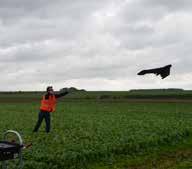
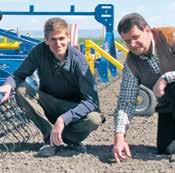
Some of our crops, such as peppers, are transplanted into plastic mulch to reduce weed pressure and retain soil moisture. Previously, only non-biodegradable plastics were used, but Ardo has been a pioneer in promoting the use of plant-based bio-plastic mulches. This new material has been well received by farmers, agronomists – and the environment. Our goal is to use plant-based bio-plastic mulches in all crops where mulches are required by 2025.
Agronomists and farmers rely on weather information to make decisions. Weather station networks are gradually being built and made available to our farmers. In order to be more efficient in our field operations, weather conditions are tracked in real time via an app.
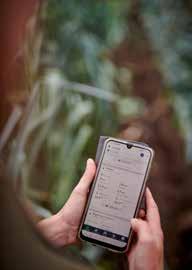
By 2025, we aim to have weather stations covering our entire contracted area, allowing us to provide irrigation advice to all of our farmers.

Since 2020, we have been gradually implementing Agreo, a modern agro-IT platform, to improve communication amongst our farmers, agronomists, and quality and production departments. This cutting-edge tool increases the transparency of in-field activities in real time and assists our agronomists in optimising their daily work. The standardisation of data exchange is a significant benefit of the IT system, along with more accurate reporting, data centralisation, better traceability, and improved communication between field and factory. We aim to provide a more efficient service to our farmers through this platform.
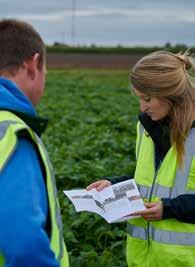
The centralisation of information also allows us to learn more from our data, producing more accurate statistics on our varieties, crop protocols, and growing techniques.
The system is now installed at 11 of the 15 Ardo vegetable and herb production sites, accounting for roughly 75% of our production volume. At the touch of a button, digitalisation provides instant visibility between upstream activities in the field and downstream actions in the factory, eliminating the need for manual tracing.
As an example, prior to harvest, an agronomist inspects the field to ensure that the field maturity is optimal and that product quality is appropriate, before transferring the observations on to a digital “Field release”. This report is available in real time for the quality and production departments to assess whether
any additional actions are required during the production process.
Approximately 25% of total observations and 12% of total tasks were recorded digitally on Agreo during 2021. By 2025, we strive to have 80% of digital crop traceability on the system, and 100% by 2030.
Several mechanised field operations may pose an increased risk to worker safety due to the size of the equipment or the speed required for some activities. That is why, in recent years, field safety has become a top priority. Ardo has taken several initiatives to improve safety, including the distribution of safety booklets, the organisation of safety meetings, the provision of high-visibility jackets, and the adaptation of machinery.

Farmers have suffered as a result of yield losses and reduced revenue due to climate change. In this context, we try to find a new balance in our contracts in order to improve their competitiveness and profitability Long-term partnerships that provide stability and security benefit both Ardo and our farmers. Each autumn, we meet with our farmers to discuss the prices for the various crops for the coming year.

We recognise our environmental impact because we grow 43,000 hectares of vegetables each year. Our activities, however, can positively impact biodiversity. We have several biodiversity improvement projects on various group sites, such as collaborations with beekeepers, flower sowing borders, and the development of nature reserves.
Through the ‘Des Fleurs et des Ailes’ project, which translates as ‘Flowers and Wings’, our Ardo site in Gourin, supported by one of our customers, encourages farmers to develop biodiversity in their farms.
As part of this initiative, 130 raptor bird houses were installed near spinach fields, and 177 hectares of flowers were sown close to pea and bean fields. This creates a vast network of habitats for insects, pollinators, and birds.
A project like this is an excellent way to educate farmers about the importance of ecosystem services and to raise community awareness of farmers’ roles. More than a hundred children, for example, visited the farms to learn about biodiversity in nearby vegetable fields.
Encouraging biodiversity is entirely in line with our mission: to plant a seed for the future.
In 2015, our Zundert site opened a nature reserve to the public. The area is 4.7 hectares in size and was unique at the time. It demonstrates how well nature and industry can coexist.
Ardo and the municipality of Zundert established the nature reserve to compensate for the Beekzicht business park and the cold store, where goods are kept at temperatures below freezing.


The green zone is an ecological connection to the stream valley of the river called Aa of Weerijs. This has resulted in a more diverse habitat for animals and plants, which with the help of a connecting zone, enables them to spread more widely across the landscape. This increases biodiversity and the number of plant and animal species.
Small songbirds, woodpeckers, buzzards, long-eared owls, bats, mice, martens, weasels, bees, butterflies, and dragonflies have created a natural chain that has transformed the nature reserve into a herbal kingdom.

Ardo was in charge of the nature reserve’s management for several years, before responsibility was transferred to “Natuurmonumenten” in 2018. We continue to contribute each year to maintain the plot we own.
We also built an apiary, a location where honey beehives are kept. After all, there is no green without bees. The Zundert-Rijsbergen department of the Dutch Beekeepers Association now manages the site.

Over the last decade, organic vegetables, fruit and herbs have grown in popularity. Our agronomists, along with forward-thinking farmers, saw this challenge as an opportunity. Producing without the use of synthetic chemicals is riskier and more uncertain, but with the same passion and pragmatic approach, we have been able to identify more vigorous varieties and appropriate growing techniques.
As a result of these efforts, our farmers have converted to organic agriculture in large numbers, and supply and demand have been balanced. Since 2015, we have more than doubled our organic production area and volume.
The consumer will decide whether the ultimate goal of our MIMOSA+ programme should be to produce everything organically. In the meantime, the new techniques learnt from organic agriculture help us optimise our conventional crop practices. We apply insights such as an emphasis on preventive rather than corrective actions, as well as the use of mechanical weeding.
In the future, we will continue to promote organic agriculture to farmers, assist them in their transition, invite them to organic events, and support the follow-up of organic crops. Meanwhile, we provide them with all of the information they need to implement organic crop itineraries.
Growing 100 types of vegetables, fruit and herbs in 12 different growing zones is complicated enough, but we must also ensure that each crop is managed in a sustainable manner. Whether it is basil production in Provence (France), pepper production in Ribatejo (Portugal), or green pea production in Hesbaye (Belgium), each actor in the production chain should be committed to implementing reliable and sustainable practices
We determined that the Farm Sustainability Assessment, delivered by the Sustainable Agriculture Initiative Platform (SAI Platform) was the best and most appropriate structure for conducting a standard evaluation of each situation, understanding local challenges, and introducing new solutions when necessary. After three years of working with Farm Sustainability Assessments (FSA), we achieved gold status for 46% of our farmers and silver status for 54% of our farmers in 2021. Our goal is to maintain and improve these verification levels.
Creating nitrogen fertiliser out of thin air
Peas, beans, and soy beans cover more than half of Ardo’s growing area. Nitrogen-fixing bacteria in the root nodules of these leguminous crops allow them to convert atmospheric nitrogen into ammonia that the plant can use. Legumes can grow in low-nitrogen soils with little or no nitrogen fertiliser.
Saving energy, lowering CO2eq emissions Because the production of nitrogen fertiliser requires

the use of a large amount of fossil fuels, growing legumes helps to reduce our CO2eq emissions and mitigate environmental issues caused by excessive nitrogen fertiliser use.
Furthermore, nitrogen fixed by legumes can replenish soil nitrogen levels for the crop that follows it in the rotation. This explains why legumes are considered to be environmentally friendly crops.
Yields have steadily increased since the dawn of agricultural development centuries ago. Growing technique advancements, the introduction of new varieties, advances in plant nutrition and plant protection, and irrigation have all helped farmers increase crop yields year after year. This held true for centuries when weather patterns were relatively stable.
But, as we all know, global temperatures are rising. According to the World Meteorological Organisation, the decade from 2011 to 2020 was the warmest on record, with the six warmest years all occurring since 2015. Since pre-industrial levels, global temperatures have risen by 1,2 degrees Celsius, with further increases expected in the coming years.
Until 2015, the impact of gradual temperature increases on vegetables, fruit and herbs growth
was largely ignored. Unfortunately, weather conditions have become more extreme and weather patterns have persisted for longer periods of time each year. Vegetables, which have a short growing season, are severely impacted by the changing climate and weather patterns, caused by extended periods of heat and drought or rain and floods.
As a result, vegetable yields have become less reliable, and our reference yields have dropped.
Faced with this new phenomenon and challenging context, we have been taking steps to strengthen our resilience to climate change while also reducing the impact of our activities on the environment. Ardo intends to prioritise these two major topics in the MIMOSA+ programme in the coming years and in the long run.
Increasing crop resilience to climate change helps secure yield and quality for our farmers and customers.
Because the beginning and end of the season have become too risky, we have had to adapt our growing programmes, shortening the planting period of several crops.
Our presence in many different growing regions allows us to grow each crop in the most favourable region and select the optimal crop combination for each area. This also enables us to split the production of our key crops across growing zones, which spreads the risk and ensures customer supply.
For example, in Northern Europe, peas were traditionally sown until the middle of June, but now we need to finish sowing them two weeks earlier.
Regenerative Agriculture
Implementing regenerative agricultural practices among our grower base increases soil fertility, which is critical for coping with extreme weather and building resilience to climate change. Our goal is to have all of our farmers using regenerative agriculture practices by 2025.
Crop rotation, cover crop management, precise soil fertiliser application (organic and mineral), and optimal soil and seedbed preparation all contribute to optimal soil fertility and structure, as well as aid in soil moisture retention. Using our agro-IT software Agreo, we can follow our KPIs and see the evolution as we improve agricultural practices on the 43,000 hectares of crops that we contract.
In addition to promoting recognised Good Agricultural Practices, we evaluate a range of innovative practices with some of our more progressive farmers acting as “pilot farms”, to explore novel regenerative agriculture techniques in collaboration with technical advisors, research centres and our customers.
In Gourin (Brittany, France), farmers and Ardo’s agronomists participate in workshops to explore potential new farming systems for developing regenerative practices. Field coordinators drive the projects that emerge from these sessions and help farmers to reduce their environmental impact. Examples of the approaches taken include the use of mechanical weeding, skipping a treatment, reducing fertiliser input, incorporating a new species in their
rotation, or planting hedges to reduce erosion. Farmers can improve their agricultural practices supported by Ardo agronomists or their local advisors.
In Violaines (North of France), we have collaborated with a number of our farmers in sowing a range of different cover-crop seed mixes and evaluating the different impacts of each, in terms of soil fertility and carbon sequestration. Whilst the growing of cover crops is already a common practice amongst farmers, our pilot farms demonstrated the considerable improvements that could be gained through optimised seed mixes. Workshops are organised with our farmers in order to exchange on the learnings derived from these experiments.
Surveys indicate that around 70% of irrigation decisions are based on farmers’ experience and feelings, according to industry research. This is a critical issue, because water is the single most important factor in ensuring the future production of our raw materials. As an estimated 25,000 hectares of crops contracted by Ardo are irrigated, we have been investing in water security to achieve the following goals by 2025:
We have been focused on reducing our environmental impact by lowering our CO2eq emissions, improving carbon sequestration in soil, or a combination of the two.
When evaluating the CO2 emissions linked to the growing and harvesting of fruit, herbs and vegetables, we observe that fertilisers have the single largest impact. In following our MIMOSA+ principles we help our farmers to optimise crop yields and product quality whilst reducing the use of mineral fertilisers. We intend to introduce a quantification method for measuring CO2eq emissions from our agricultural practices in 2023, and this will enable us to set clear targets and follow the evolution.1
Soil sequestration of carbon
Farming practices are often criticised for the CO2 emissions generated by farm machinery and the use of
100% of our crops will be subjected to water risk assessments
100% of the water used to irrigate our crops will come from renewable sources
100% of irrigation activities will be based on crop needs or soil moisture deficit measurements
agricultural inputs. Farming however, can also have a positive impact on the environment, particularly when activities are introduced that support the capture of carbon in the soil, a process known as carbon sequestration.
The field activities performed by our farmers during the production of a crop for Ardo are important. However, even more significant, are the farming practices that are carried out during the several intervening years of crop rotation, before a field returns to producing a vegetable, fruit or herb crop for Ardo. By supporting the implementation of regenerative agriculture practices, our MIMOSA+ programme goes beyond an individual crop. Whilst Ardo awaits the arrival of a practical and reliable tool to measure the CO2 balance in the soil, we are committed to supporting our farmers with the continued promotion of Good Agricultural Practices and providing them with the most recent findings on carbon sequestration.2
1 We have been hesitant to publish data because we are concerned that the various metrics used and assumptions made in the range of CO2eq models available could cause confusion and lead to poor decisions. Instead, we advocate for a standardised European methodology to calculate category-specific Product Environmental Footprints (PEF).
2 In the absence of a robust model to measure sequestration, we chose soil sampling in order to create a picture of the current situation, track evolution, and provide data points for when an appropriate model becomes available.
Growing up near one of our factories, Guillaume Fraipont’s passion for agriculture continued into adulthood, as evidenced by his bioengineering degree. Six years ago, he fulfilled his lifelong ambition by joining Ardo as a field agronomist. Meanwhile, he has progressed to the group level, where he remains committed to our long-term agronomy vision: “Because agronomy and sustainability are strongly linked, I am confident that our field actions will have a positive impact.”

In 2013, Ardo developed MIMOSA, an agronomy sustainability programme, to align crop production operations with environmental needs. It is an acronym for ‘Minimum Impact, Maximum Output Sustainable Agriculture’. Within the group, Guillaume is responsible for internal and external communication about the initiative.
The goal is to reduce the environmental impact of practices and inputs such as seed, fertiliser, plant protection products and water use. Simultaneously, we want to maximise crop yield and quality,” he explains. “Active Field Management is a key concept at Ardo: where our crop experts in the fields allow us to deliver the best advice to farmers to constantly optimise our crops.”
To improve crop resilience to climate change, Ardo created MIMOSA+. This 2.0 version goes beyond the crop itself. “Our strategy is more preventive than corrective. That is, if the plant is given optimal conditions, it has a better chance of reaching its full potential,” he explains. Ardo’s objective with MIMOSA+ is to secure yield and quality for its farmers and customers. These efforts will be evaluated in the coming years.
Water management is one of the actions included in the MIMOSA+ programme. The goal is to assess the water risk for all crops, use only renewable water sources, and use irrigation based on advice and risk analysis.
Another measure is the improvement of soil health, with Ardo striving to have all farmers practising regenerative agriculture principles by 2025. “The aim of this type of farming is to increase soil fertility. Meanwhile, by sequestrating carbon in the soil, regenerative agriculture aims to mitigate climate change,” Guillaume says. “We are also working to reduce the carbon footprint of our crops. Finally, we carry out environmental projects that improve local biodiversity, such as collaborations with beekeepers.”
Ardo applies innovative crop management techniques in the field, which Guillaume is in charge of developing. Precision sowing, GPS steering, and camera-guided weed control are three examples of this. “We recently implemented a new technology to detect foreign objects in the field using drones. Based on a generated map, the contaminant is geo-located in our spinach crops before harvesting,” he says.
Since 2016, Ardo has reduced the use of fungicides by 28%. “We have achieved 76% residue-free vegetables as a result of our efforts to optimise crop management,” Guillaume reports. While MIMOSA has helped improve crop conditions, climate change has had a negative impact on crop volume and quality in recent years. “We had to react,” Guillaume continues, “because it is in our DNA to make a real difference.”
Because of Ardo’s shared passion and long-term vision, Guillaume is optimistic about the future. “Whilst our farmers are busy introducing our MIMOSA+ actions; these actions need to be quantified and promoted, especially given the market and climate variability. The group-wide introduction of a dedicated informatic platform will help us to achieve this.”
Guillaume refers to the implementation of Agreo, an IT software system that digitises crop monitoring and follow-up. He is most proud of the fact that the software is now operational at 11 out of 15 of Ardo’s production sites. “The advantages of centralisation include better traceability, communication between parties, and reporting. This enables us to improve our performance by learning from our real-time data.”
“We have achieved 76% residue-free vegetables as a result of our efforts to optimise crop management”
In the production phase, we have been examining our actual carbon footprint. We have been investigating how we can better manage our energy and water consumption as we use still considerable quantities of both. Our organic waste streams are also being valorised through biomethanisation and/or external channels, such as feed and composting. This is what we refer to as our circular economy approach. This approach also includes our packaging activities.
We contribute to a more stable climate for future generations by creating real surplus value for all stakeholders in the supply chain. To achieve this, we need an estimate of our climate impact. For this reason, we have calculated our carbon footprint since 2019.
According to the Greenhouse Gas Protocol, the CO2eq emissions of a carbon footprint are classified into three categories:
Scope 1 includes all direct emissions from the Ardo processing plants in Europe. As a result, natural gas combustion is the primary source of scope 1 emissions. These CO2eq emissions are also caused by the fuel combustion in the vehicles of the company fleet.
In scope 2, we calculate the indirect CO2eq emissions from the electricity and heat we purchase in Europe.
In scope 3, we plan to calculate the indirect CO2eq emissions from sources throughout the supply chain. This information is not included in this report, given the lack of standardised methods for determining CO2eq in agriculture at this point.
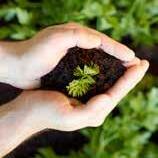
Ardo’s goal 2030 vs. baseline 2019
2021/2022
Ardo is committed to take significant steps in further reducing our carbon footprint. Through investments in more solar panels, biomethanisation and energy recuperation and by continuously improving our energy efficiencies in manufacturing and (cold)storage. We are confident to achieve even higher future goals by a combination of multiple actions and programmes in our operations. In 2022 Ardo has decided to reset and increase our future goal with the objective to achieve 40% reduction of our carbon emissions per metric ton produced (TCO2eq) in scope 1-2 by 2030 compared to the base line (2019).
Ardo is deeply committed to becoming more energy efficient. We closely monitor our energy consumption and invest continuously in the most energy-efficient plant and equipment to ensure we use as little energy as possible. We optimise energy recuperation to produce heat from cold and cold from heat, and we invest in our own green energy production to utilise all of our resources and by-products. In addition, we set high standards for the water we use in our production processes. Water is a valuable resource that we recycle and reuse whenever possible.
While examining every stage of our operations, we identified enormous ‘green potentials’ just waiting to be tapped from within the flows of our processes. We have started with the low-hanging fruit, investing in resource conservation and developing our own circular economy. The various process flows are depicted in this diagram and are explained with specific examples from our Ardooie factory in Belgium.
Producing fresh frozen products requires the use of a variety of natural resources, including freshly harvested vegetables, fruit and herbs, as well as water and energy. Our resources are extremely valuable, which is why we strive to use them in the most sustainable and circular manner possible:
Once harvested, our vegetables, fruit and herbs are freshly frozen and stored at our production plants before being delivered to our customers. Creating such cold temperatures inevitably generates residual heat, which we capture and reuse to heat our offices and make hot cleaning water. When the weather is hot, we recycle the cold from the floor heating of our cold stores to keep our employees cool.
In our anaerobic digestion plant, the biomethanisation process converts vegetable residues into biogas. This powers generators that convert the gas into green energy, both electricity and steam. Our green electricity, which is supplemented by electricity generated by a raft of solar panels floating on our irrigation reservoir, is used to freeze and store our vegetables. Meanwhile, the green steam is used to steam peel and blanch vegetables. These methods meet up to 40% of the energy needs of the Ardooie plant.
By-products are converted into organic fertiliser, which is used by our farmers to grow crops for the following season.
We try to minimise our consumption of water and maximise our re-use in each production step. Water used in vegetable processing is collected and purified in our biological wastewater treatment plant. The purified water is then used again to wash the vegetables brought in from the fields. The remaining water is stored in a massive 150 million litre reservoir, which 45 local farmers can use to irrigate their crops via 150 hydrants.
Our new headquarters was built using ‘almost energy neutral’ principles. That is, it consumes very little energy and only uses energy derived from renewable sources. There is more information on this in chapter 4


At our Ardooie site, a brand-new machinery room has been built, designed to the most recent state-of-the-art cold production principles and optimising the working environment for our technicians. The residual heat is used to make warm water, reducing our reliance on gas or other combustibles.
While the projects described are from the Ardooie site, the same principles are followed throughout the Ardo group. There are numerous examples of sustainably driven investments and activities at other factories.
Ardo has developed close relationships with major key players in the supply chain of plastic granulates and packaging materials since 2019. A close collaboration and the introduction of new materials resulted in new formulations for our PE (polyethylene) packaging film. Because of this, we were able to significantly reduce film thickness while maintaining strength and appearance.
By the end of fiscal year 2021-2022, the average micron had been reduced from 50 to 42 (-16%). By 2025, we aim to have achieved a similar average micron reduction for 75% of our PE film.

All of Ardo’s paper-based packaging has been 100% recyclable since 2019. We see an increase in customer interest with the first customers switching to 100% paper bas, after a successful trial was conducted.
By the end of fiscal year 2021-2022, approximately 60% of the total volume of foil packaging used to pack our frozen products was made from a single (mono) base plastic, such as PE (polyethylene) or LDPE (low density polyethylene). Because they are made of a single type of plastic, mono foils are recyclable.
40% of the plastic foils are laminates made from two base films to ensure the packaging’s functionality. If the laminate is made from two different types of plastic, the packaging material is more difficult to recycle. Since 2020, we have reduced the share of non-recyclable laminates by 40% by switching to recyclable laminates or mono films. Simultaneously, we have increased the proportion of recyclable laminates by 25%.
Our goal is to convert 80% of non-recyclable foils to recyclable mono foils or single film recyclable laminates.
The transition from white to brown cartons began at the start of 2020. By the end of fiscal year 2021-2022, roughly 70% of all corrugated cartons were made from brown recycled material. We managed to convert to 100% of all cartons in Ardooie, Geer, Koolskamp (Belgium), and Zundert (the Netherlands) to brown material. Other Ardo sites have already seen a significant shift from white to brown. By 2025, we aim to have converted 80% of our corrugated cartons to brown, with only specific customised packaging solutions remaining in white.
This eliminates the need for treatments to whiten the cartons, as well as the introduction of additional chemicals. It also allows for a reduction in the thickness of the papers used for corrugated cartons, as whitening reduces the strength of the paper and thus requires thicker materials.
Long before the term ‘Sustainability’ became fashionable, Ardo was growing and producing frozen vegetables in a sustainable way. Today we approach sustainability as one big inter-country team: a team that sees the whole picture, and where everyone is invited to contribute and to work together to develop our future objectives and goals. We have astonished ourselves by the progress we have made through collective sustainable thinking, and we are convinced that our green ambitions and our green actions are good for People, Planet & Product, and make sound economic sense, ensuring a sustainable future for our company.


The Global Reporting Initiative (GRI) is an independent, international standards organisation that helps businesses and other organisations take responsibility for their impacts. Located in Amsterdam, GRI provides a common global language that enables stakeholders to consider the impacts of climate change, human rights and corruption, and assists them to communicate on these issues. This network of experts claims they offer the world’s most widely used standards for sustainability reporting, the so-called ‘GRI standards’. With thousands of reporters in more than 100 countries, the standards are advancing the practice of sustainability reporting. The information gathered in the sustainability reports based on the GRI standards enable companies and their stakeholders to take action and make better decisions that create positive economic, environmental and social benefits for everyone. You can read more here: https://www.globalreporting.org/ Ardo’s sustainability report has been inspired by these GRI standards. In a table below we added a GRI index. In this table you can find which information is needed for a sustainability report according to the
GRI standards (GRI code in the first column with the description in the second column). In the third column you can see where this information can be found in Ardo’s sustainability report (the specific chapter is mentioned). All GRI standards we use for this sustainability report stem from the version of 2020. More details you can read here: https://www.globalreporting.org/how-to-use-thegri-standards/gri-standards-english-language/ Ardo’s sustainability report doesn’t claim completeness. Some data about particular topics are still lacking. This GRI-index does not specify a reference to the ‘core set’ or ‘comprehensive accordance’ of the GRI standards. The table below gives an overview on the available information up to the most recent year. With the GRI reference table providing the framework, and with a sense of ownership within Ardo, we feel challenged and inspired to take the next steps. Our ambition for our next report will be to capture a number of the GRI specified areas that we still miss today, and build alignment with other anticipated requirements for sustainability reporting.
100 Universal standards
102-1 Name of the organisation CH1 102-2 Activities, brands, products and services CH1 102-3 Location of the headquarters CH1 CH6 102-4 Location of the operations (number & name of countries) CH1 102-5 Nature of ownership and legal form CH1 102-6 Markets served (including regions where products and services are offered) CH1 102-7
Scale of the company (including total number of employees, quantity of products or services, sales) CH1 102-8 Information on total number of employees divided by CH4
. type of labour contract (permanent or temporary) and gender and region
. type of employment (full-time or part-time)
. share of work performed by external workers (not employees)
. Significant variations in number of employees 102-9 Description of the main elements in the supply chain relevant for the core activities CH3 102-10
Significant changes to the company (scale, structure, ownership) and its supply chain (during reporting period) 102-11 Precautionary principle 102-12 Signed charters of external initiatives 102-13 Membership of associations CH3
Strategy 102-14
Statement from senior decision-maker about the relevance of sustainability to the company and its future 102-15 Description of key impacts, risks and opportunities
Ethics and integrity 102-16 Description of values, principles, standards and norms of behaviour 102-17 Mechanisms for advice and concerns about unethical and unlawful behaviour and company integrity (whistleblowing) CH4 Governance 102-18 Governance structure 102-19 Process of delegating authority from highest governance body downwards 102-20 Executive-level responsibility for economic, environmental and social topics 102-21 Processes of consultation between stakeholders and the highest governance body 102-22 Nature of the composition of the highest governance body and its committees (according to independence, stakeholder representation, gender, etc.) 102-23 Nature of the chair of the highest governance body highest governance body 102-24
Criteria for nominating and selecting the highest governance body (independence, diversity, stakeholder representation, expertise) 102-25
Avoiding conflict of interest with suppliers or shareholders 102-26
Role of highest governance body in setting purpose, values, and strategy 102-27 Collective knowledge of highest governance body 102-28 Evaluating the highest governance body’s performance 102-29
Role of highest governance body in implementation of ‘due diligence’ processes 102-30
Role of highest governance body in reviewing effectiveness of risk management processes 102-31 Frequency of the highest governance body review of key impacts, risks and opportunities
GRI code Description
102-32 Role of highest governance body in sustainability reporting 102-33
Description of the communication process of critical concerns to the highest governance body 102-34 Nature and total number of critical concerns communicated to the highest governance body 102-35
Description of remuneration policies for the highest governance body and senior executives 102-36 Process for determining remuneration 102-37 Stakeholders’ involvement in remuneration 102-38 Annual total compensation ratio (highest to median) 102-39 Evolution in annual total compensation ratio Stakeholders’ engagement 102-40 List of stakeholders engaged by the company 102-41 Share of employees covered by collective bargaining agreements 102-42 Basis for identifying and selecting stakeholders with whom the company wants to engage 102-43 Approach to stakeholder engagement 102-44 Key topics and concerns raised through stakeholder engagement
102-45
Reference to the information included in the publicly available consolidated financial statements 102-46 Description of the process for defining report content and topic boundaries (materiality) 102-47 List of material topics 102-48 Effects of any restatements of information (to previous reports) 102-49 Significant changes in reporting from previous reporting period 102-50 Reporting period 102-51 Date of the previous report 102-52 Reporting cycle 102-53 Contact point for questions regarding the report 102-54 Claims of reporting in accordance with GRI standards CH6 102-55 GRI content index CH6 102-56 External assurance for the report 200 Economic standards
Economic performance 201-2 Financial risks and opportunities due to climate change
Market presence 202-2
Proportion senior managers hired from local communities
Indirect economic impact 203-1 Impact of investments in company infrastructure and services on local economy and communities
Procurement practices 204-1 Proportion of spending on local suppliers
Anti-corruption 205-1 Share of operations assessed for risks related to corruption 205-2
Communication and training about anti-corruption policies and procedures 205-3 Confirmed incidents of corruption and actions taken
Anti-competitive behaviour
206-1
Tax 207-1
Number of legal actions in anti-competitive behaviour, anti-trust and monopoly behaviour, in which the company participates
Description of tax strategy, and a link to relevant publicly available information 207-2
Description of tax governance and control framework in relation to the company’s compliance obligations
302-1 Energy consumption within the company, divided into non-renewable and renewable sources
302-2 Energy consumption outside of the company, divided in upstream and downstream activities
302-3 Energy intensity = energy efficiency
302-4 Reduction energy consumption Water and effluents
303-3 Water withdrawal, divided by source (e.g. groundwater, surface water, civil water, etc.)
303-4 Water discharge, divided into freshwater (< 1,000 mg dissolved solids/litre water) and other water (> 1,000 mg)
303-5 Water consumption = water withdrawal – water discharge
102-43 Approach to stakeholder engagement
102-44 Key topics and concerns raised through stakeholder engagement
Biodiversity
304-1
Description of all relevant operational sites owned, leased, managed in, or adjacent to, protected areas or areas of high biodiversity value
304-2 Significant impacts of activities, product and/or services on biodiversity 304-3 Partnerships with third parties to protect or restore habitat areas CH5
305-1 Direct emissions GHG (scope 1) CH5
305-2 Energy indirect emissions GHG (scope 2) CH5 305-3 Other indirect emissions GHG (scope 3)
305-4 Intensity GHG emissions (by activity and/or product)
305-5 Reduction of GHG emissions CH5
305-6 Emissions of ozon-depleting substances (ODS) 305-7 Nitrogen oxides (NOx), sulphur oxides (SOx) and other significant air emissions
Waste 306-3 Total weight of waste generated 306-4 Wasted diverted from disposal 306-5 Waste directed to disposal Environmental compliance 307-1 Non-compliance with environmental laws and regulations
Supplier environmental assessment
GRI code Description
403-7
Description of prevention and mitigation of occupational health and safety impacts directly linked to the company’s operations
403-8 Share of workers covered by health and safety management system
403-9 Rate of loss of working hours due to work-related injuries
403-10 Number of cases of work-related ill health
Labour/management relations
404-1
404-2
404-3
Average hours of training per employee per year, divided by employee category
Description programmes for upgrading employee skills and transition assistance programmes CH4
Share of employees receiving regular performance and career development reviews CH4
Diversity and equal opportunity
405-1 Diversity of governance bodies and employees by gender, age, and other indicators of diversity)
405-2 Ratio of basic salary for women and men by employee category
Non-discrimination
406-1 Number of incidents of discrimination + corrective actions taken
Freedom of association and collective bargaining
407-1 Operations and suppliers in which the right to freedom of association and collective bargaining may be at risk
Child labour
408-1 Operations and suppliers at risk for incidents of child labour Forced or compulsory labour
409-1 Operations and suppliers at risk for incidents of forced or compulsory labour
Security practices
410-1 Share of security personnel trained in human rights policies
Rights of indigenous people
411-1 Incidents of violation of rights of indigenous people
Human rights assessment
412-1 Operations subject to human rights reviews 412-2 Employee training on human right policies
412-3 Share of investments including human rights screening
Local communities
413-1 Operations with local community engagement CH3 413-2 Operations with significant negative impact on local communities
Supplier social assessment
414-1 Share of suppliers screened on social criteria
Share of new suppliers that were screened using environmental criteria 308-2 Share of suppliers with negative environmental impact and actions taken
308-1
400 Social standards
Employment
401-1 New employee hires and employee turnover
401-2 Benefits provided for FTE and not to temporary or part-time employees
401-3
Share of employees coming back to work after parental leave (+ retention of 1 year)
Labour/management relations
403-1
403-2
403-3
403-4
403-5
403-6
Description of the occupational health and safety management system in place
Description of processes for hazard identification, risk assessment, and incident investigation
Description of services for occupational health and safety
Description of the processes for worker participation, consultation, and communication on occupational health and safety
Description of worker training on occupational health and safety
Description of voluntary programmes on promotion of worker healthy lifestyle CH4
414-2 Share of suppliers with negative social impact + corrective actions taken
Public policy
415-1 Monetary value of contributions to political cause
Customer health and safety
416-1
Assessment of health and safety impact of product and/or service categories
416-2 Incidents of non-compliance to health and safety regulation concerning products and/or services
Marketing and labelling
417-1
Share of products and/or services with required information and labelling to all products and/or services with potential impact on safety, environment or social topics
417-2 Incidents of non-compliance concerning product and service information and labelling
Customer privacy
418-1
Number of substantiated complaints concerning breaches of customer privacy and losses of customer data
Socio-economic compliance
419-1 Description of non-compliance with laws and regulations in the social and economic area
More info about how Ardo uses your data: https://ardo.com/en/privacy-policy-customers-and-suppliers

FOLLOW ARDO AT WWW.ARDO.COM
ARDO - WEZESTRAAT 61, 8850 ARDOOIE (BELGIUM)